Real-time global dispatches as America heads to the polls.
It’s Election Day 2016, the culmination of months of political gut-punches that have made this election cycle feel more like a long, national gauntlet than democracy as usual. We reached out to correspondents around the globe and asked them to tell us what the world thinks of this soap opera of an election. From the streets of Mexico City to the bars of Beijing, we’ll be publishing these dispatches over the the next two days as the vote comes in and then as the world reacts. Push aside that stomach-curdling anxiety and join us as we travel the globe to hear what others are saying about the vote, the candidates, and how to make sense of this very strange trip to the ballot box.
This page will be regularly updated, but you can also skip directly to:
2:15PM EST Nastasya Tay in Sydney, Australia
1:00PM EST Lindsay Gasik in Hawaii, USA
12:15PM EST Julia Steers in Nairobi, Kenya
11:30AM EST Robert Foyle Hunwick in Beijing, China
10:03AM EST Matt Goulding in Barcelona, Spain
8:20AM EST Alex Dziadosz in Beirut, Lebanon
8:01AM EST Alyson Neel in Yangon, Myanmar
7:48AM EST Yepoka Yeebo in Brighton, England
10:57PM EST Michael Snyder in Mexico City, Mexico
09:20PM EST Cara Parks in New York, USA
05:55PM EST Nathan Thornburgh in Jamel, Germany
04:55PM EST Pablo Medina Uribe in Bogotá, Colombia
04:38PM EST Shirin Bhandari in Manila, Philippines
04:15PM EST Haseeb Asif in Lahore, Pakistan
03:55PM EST José Andrés in Washington, DC
12:32PM EST Matthew Bremner in Eriska, Scotland
11:35AM EST Katherine Long in Dushanbe, Tajikistan
11:01AM EST Marco Ferrarese in Penang, Malaysia
09:11AM EST Alexa van Sickle in Vienna, Austria
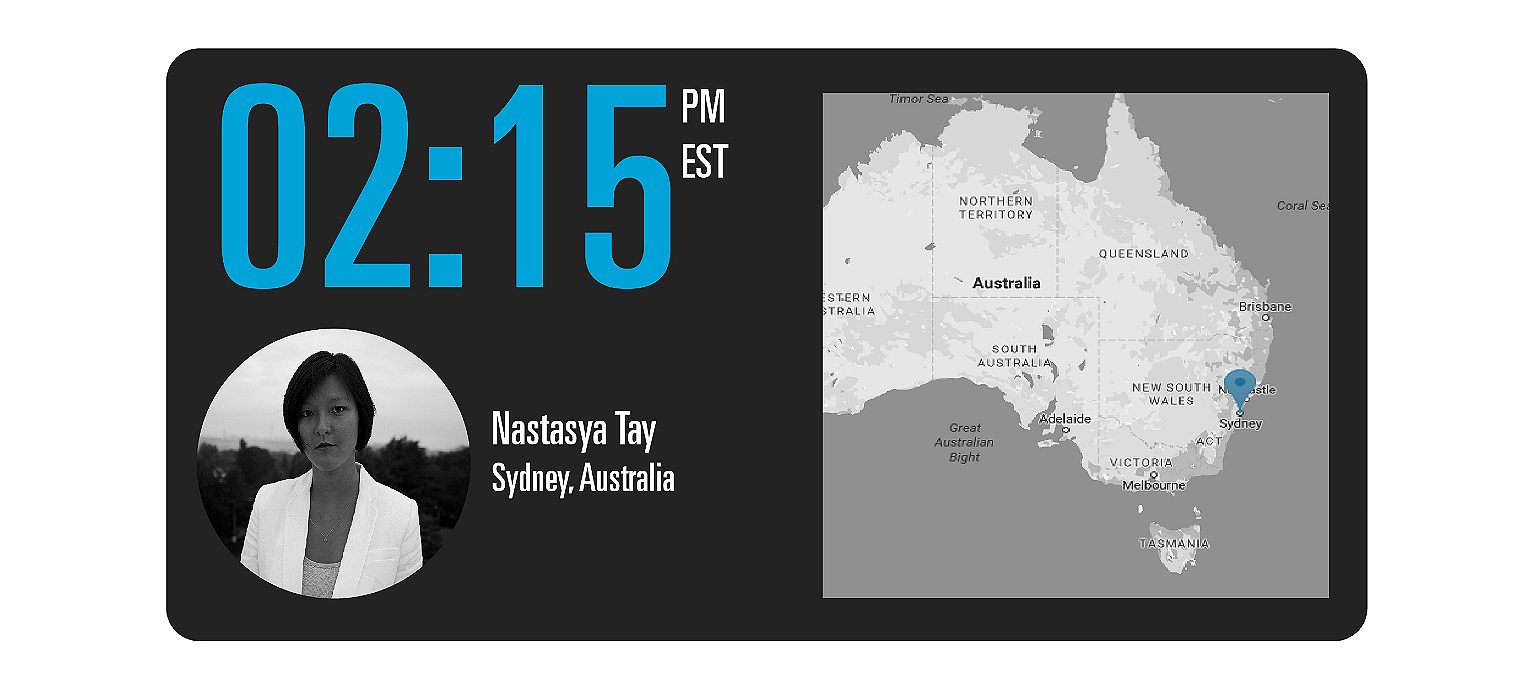
The boys on the Sports desk shout STAND BY STAND BY every time there’s a CNN projection countdown. Every time there’s a Trump win, someone shouts SEE I TOLD YOU.
Part of my job today is to work out if the Russians are going to bomb Syria when they think the world isn’t looking, but I can’t think.
There are 34 television screens in my sightline. The one closest is showing a live shot of the Empire State, Hillary and Donald’s faces painted on in lights, above a giant, bold-red Arial 270. It feels a little Hunger Games, a little Black Mirror, a little 1984.
It’s been a strange day. Where the harbour meets the sea, by the lighthouse where I live, the sky is bulbous, the air cramped. Even the flies are more restive than usual.
There’s been a recent invasion of unidentifiable small flying bugs coating windowsills and ceilings and wall moldings. I watch a haze roll out into the Pacific. Haha, we’ve been joking, it’s the end of the world.
Our social media editor is showing a cartoon of the Statue of Liberty covering her eyes to whoever walks past. The caption: I can’t watch.
She’s wearing a heart-rate monitor to monitor her latest diet. Is today a good day for that? I ask. She laughs a high-pitched nervous laugh that ends with a question mark.
Everyone’s watching different numbers. We’re all trying not to click on the New York Times. Too soon, we say, dancing with denial, too soon.
I ask the Filipino barista in the canteen who’s going to win. That Trump man, he says. You don’t seem too bothered, I comment. He shrugs. What difference does that kind of thing make?
At 2:33 p.m., the man I’ve just started dating texts me: Have we got enough to buy a Greek island between us?
The peso has fallen 11.5 percent. I suggest Mexico.
I hit refresh again on my browser. fivethirtyeight.com has a Trump win at 55 percent.
Kirsty leans over from the next desk. I’ll come, she says.
Oh well, there goes the Paris climate agreement, a cadet shrugs.
We’re live from the newsroom so no one’s allowed to throw things or scream profanities.
Our anchor sees my face; turns around from our makeshift election center. Yep, she says, making a face of her own, pursed lips with perfect white suit.
How are you feeling, I ask.
Sad, she says, completely deadpan.
No one has any more words.
At 3:04 p.m., cartons of Krispy Kremes emerge on the production desk. They’re from the boss. It’s time, she says, slowly shaking her head.
Someone produces a Trump bobblehead, Snapchats him amid the glazed donuts. My lunch is sitting in my throat, she says. Got to try to swallow it down. It’s like an awkward wake, but no one can work out who’s died.
Stockmarkets are crashing around us in jagged shards.
How are you feeling, I ask Helen, who’s following Team Trump. Sick, she says, with a half-fake-laugh.
An email is doing the rounds titled FUCK FUCK FUCK FUCK FUCK. It’s a photo of a Ben & Jerry’s vending machine, with the words “What flavour goes with the apocalypse?”
I join three producers on a comfort-eating break in an attempt to focus on a package about a newly-discovered mass grave near Mosul.
Lucky you, one says. Today that’s the less terrifying story.
I emerge from an edit suite as Trump takes the stage. There’s a peculiar silence; just delayed versions of his voice echoing from screen to screen to stony face.
Horror doesn’t often look this incredulous. It also doesn’t usually happen in Australian prime time.
Faces are turned to televisions, but eyes are darting from corner to corner. We look at each other to make sure it’s true; to try to work out what we should do with our faces. No one knows.
Pizzas are ordered. Mexican, because, you know, in solidarity. They arrive lukewarm, the cheese a little plasticky on top. Surreality circulates through the air conditioning vents.
I hand around Sriracha from my filing cabinet. There are lukewarm beers, a lukewarm blend of white wine.
There’s still a live show going on in the newsroom but no one cares anymore. I drink at my desk.
How are you looking so gleeful, I ask Gary, sitting opposite. Aren’t you terrified?
“I’m terrified, but it’s so exciting!” He’s approaching vague nervous hysteria.
“He’s got a friendly Senate. There’s no handbrake on this hillbilly wagon. It’s going all the way.”
On the way to the loo, a senior producer is grinning. “This is going to be so much fun.” I wonder if he’d be clapping his hands in private.
“There are checks and balances. They won’t let him go crazy. But it’s going to be so much fun.”
Prime Minister Malcolm Turnbull is on TV wearing a wattle yellow tie, talking about the ties that bind, so strong. But there’ll be no Trans-Pacific Partnership agreement, no promised new, rich markets for Australian beef.
Opposition leader Bill Shorten says he’ll call it as he sees it. Respect for women, racial, religious minorities; otherwise he’ll tell Trump what he thinks.
One Nation anti-immigration-anti-multiculturalism-Halal-certification-funds-terrorism Senator Pauline Hanson is cracking open the champagne in front of Parliament, quite literally; she’s found a camera to document it, too.
Her mate shouts a toast, “To the deplorables!”
She leans into the camera. “Good on ya, Donald,” she says.
I leave the newsroom, half-drunk lukewarm light beer in hand.
Sweet dreams, I say. Cheers.
Maybe tomorrow we’ll all wake up, and this will have been a dream, someone pipes up hopefully.
A few are clustered around a bank of screens in the lobby: solidarity in incredulity.
The security guard shakes his head, all hangdog.
I can’t believe it, he says. It’s completely unbelievable. I can’t believe it. It’s just, yeah, you know, unbelievable. Bernie could have won it, couldn’t he?
The road to Bondi is slick and dark. It’s drizzling; the sort of drizzle that makes everything go out of focus, but isn’t enough to turn your windscreen wipers on. A sort of middling nothing. I realize my brakes are failing.
The radio is segueing to their all-night Sleepless in Sydney show.
I’ll leave you with The Clash, the DJ says.
“On a day like today; Straight to Hell.”
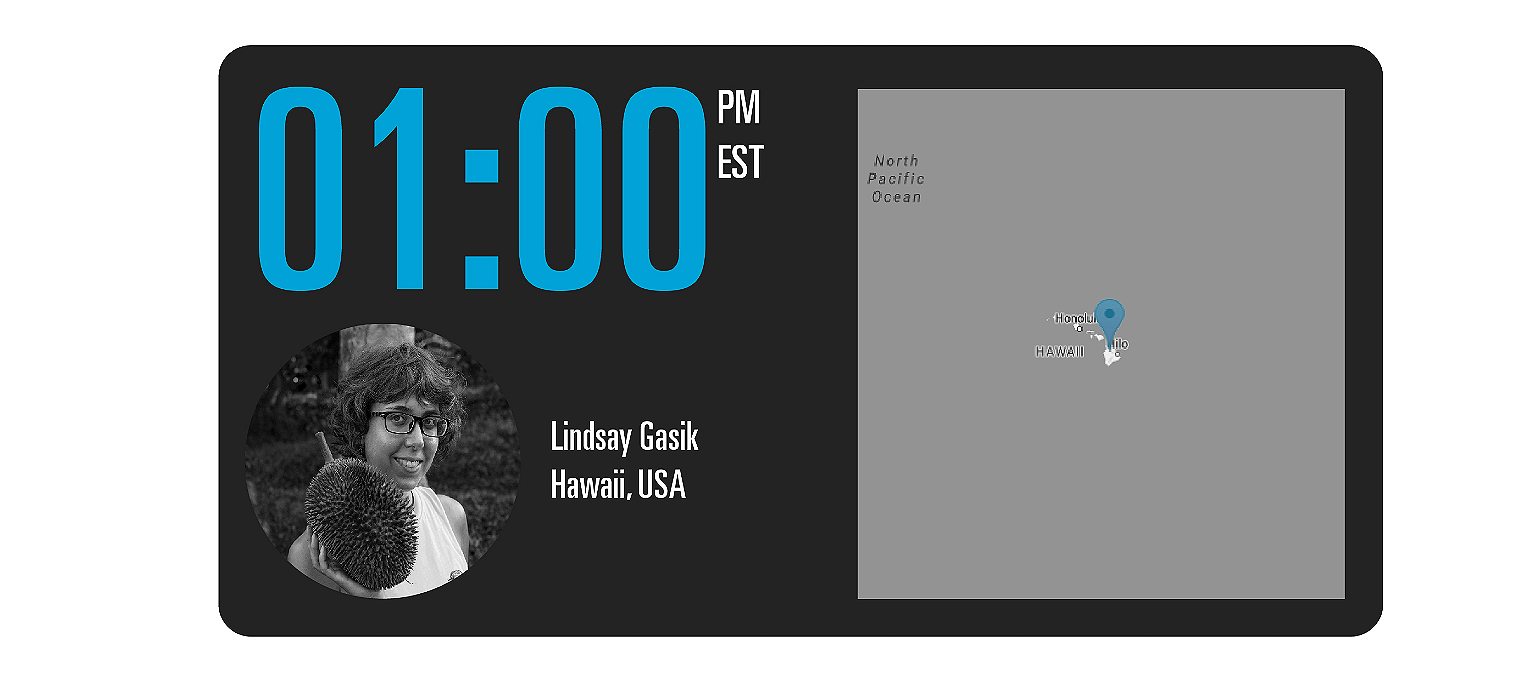
“Oh yeah,” my friend exclaims when I ask him if he voted. “Today’s election day, isn’t it?”
You’d think he wouldn’t be able to forget after months of media hoopla. Here, though, it’s just a quiet, drizzle-drenched Tuesday. I flip-flop along the pastel-painted storefronts, passing a few tourists munching peanut-encrusted ice cream sticks and shopping for macadamia nuts and t-shirts. I’m searching for some sign that the election is actually happening. I see no campaign posters in windows, no bumper stickers on cars, no newspapers anywhere.
The stillness is almost eerie. Only the ocean seems disturbed. White waves streak sideways over the seawall against a horizon that is slate grey.
At 4 p.m. I settle onto a stool for happy hour at the Conscious Culture Kombucha Bar. I sip my bubbling pilsner of Palo Santo Purification and open the presidential polls on my phone. It’s already 9 p.m. on the East Coast, and Trump is in the lead.
I show the bartender the election map. She winces; then assumes a positive attitude. “Well, maybe he’s what we need to wake America up that this is the path they’re choosing.”
“Have you voted?” I ask. She wipes up a fizzing spill of Sage Seer. “No,” she says. “I don’t believe in the system.”
“Which system?” I’m baffled.
“It’s all corrupt.” She shrugs.
A woman comes in with several bottles to fill. I ask her if she voted. “No,” she says. “Why dwell in that energy? Also, I think I’m still registered to California.”
I’m quickly realizing that a lot of people haven’t voted. In 2012, a lousy turnout of only 44.5 percent of eligible voters inspired CNN to dub Hawaii “the state that doesn’t vote.” According to a 2014 survey, Hawaii is also the only state that perceives both its legislative and executive branches as very corrupt.
I talk to a native Hawaiian woman with hair beautifully coiled and pinned with a dangling flower pendant. She voted all right, but she looks disgusted. “All the kālai’āina just taking the kumuwaiwai of the people and where does it go?”
I agree, even though I’ve only understood a few words. Hawaii both is and isn’t America. Whatever troubles the new presidency will seem far away.
When the voting closes, Trump is already clearly the winner. I call my friend. Did he end up voting?
“Nah,” he says. “What’s the point?”
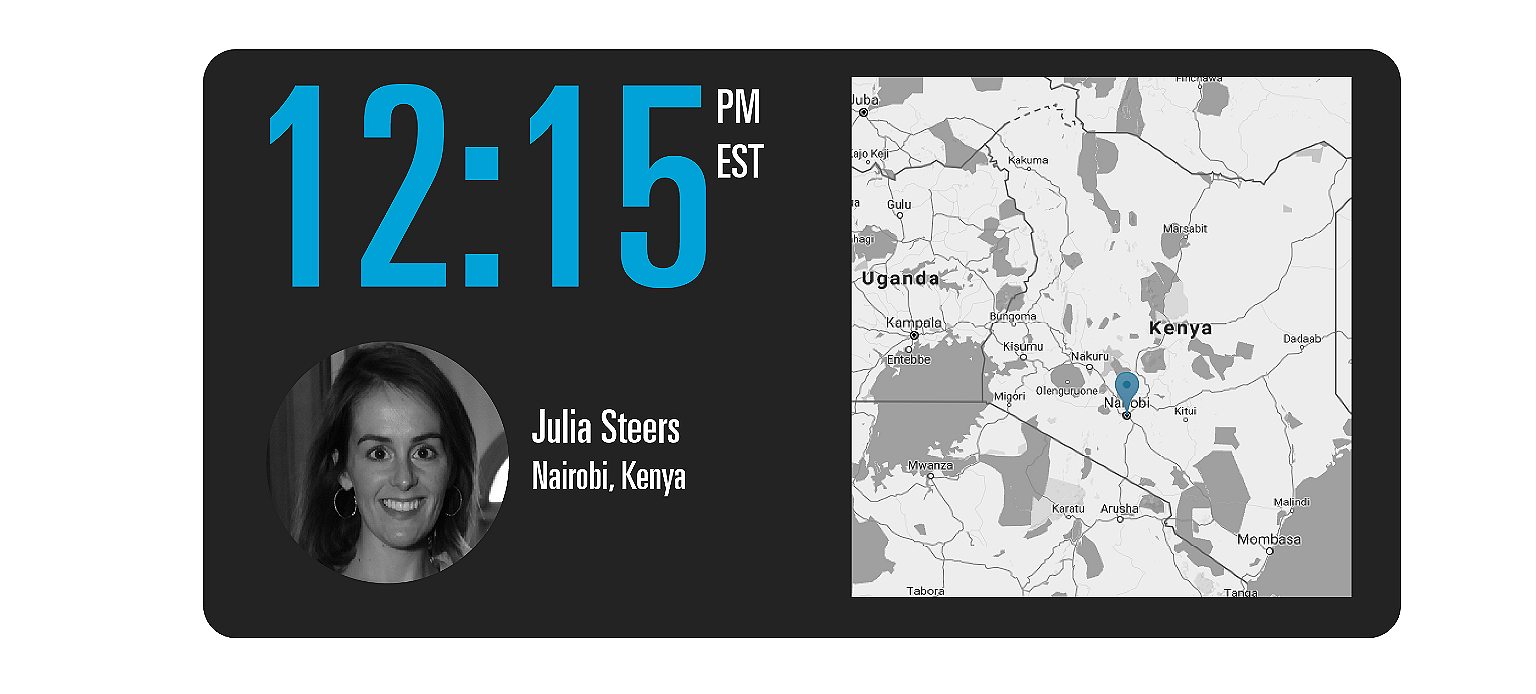
On the evening of November 8, a group of roughly 20 earnest Americans have gathered in Nairobi’s Hurlingham neighborhood to phone bank for the Hillary Clinton campaign. They are joined by Kenyan and British friends and have been making calls for about three hours, with plans to continue until midnight.
The party spills onto the back patio and a well-known Kenyan TV presenter and her bulky two-camera crew weave through the bungalow, broadcasting updates every 30 minutes or so. The hostess—clad in an #ImWithHer t-shirt—chats about at-risk swing states and attempts to break down the electoral college for the presenter’s Kenyan audience.
Top-40 pop music plays in the background and callers follow their scripts: “Hi, I’m X. I’m calling from the Hillary for North Carolina campaign. Can we count on your support today? I’m calling from Nairobi, Kenya because I care so much that you get out to vote today. Do you know where our local polling station is?”
There is a sense of collective relief as this small group of keyed-up Americans relieve election night jitters. Far from home and weary of explaining an incomprehensible election cycle to our Kenyan friends and fellow expats, at least we can do this, they say.
By 9 a.m. local time on November 9, the election-watch breakfast event is going into its fifth hour at the American Embassy in Kenya. When it got underway, at 5 a.m. local time, there was a jovial “democracy-in-action” atmosphere. Attendees range from embassy staffers, to media, foreign dignitaries, and bleary-eyed Kenyan school children in their matching, pressed uniforms.
In a large tent festooned with red, white, and blue ribbons and American flag banners, American eyes are on the floor-to-ceiling CNN screen.
Young Kenyans queue for coffee and joke about who will get the contract to build the wall.
The smiles of America-watchers tighten to pursed lips as returns roll in for a vote count no one imagined could be this close. Some chattier spectators spill into outer tents, where TV monitors broadcast BBC and Al Jazeera coverage.
The crowd in the main tent grows. People are standing up in the back.
“These idiots in fucking Pennsylvania wasting votes on Jill Stein,” a young American man says.
CNN talking heads turn to this supposed “rejection of elitist politics.”
A young woman responds, “If Donald Trump isn’t an elite, I don’t know who is.”
Two women, eyes glued to the CNN coverage, hug each other in their seats. “I need a boost,” one says. A middle-aged American woman walks away to find her husband. “I need to hold someone’s hand,” she jokes, nervously.
A few embassy staffers stand in the corner by a “United States electoral map,” arms crossed.
Over a plate of croissants and sausages, a Kenyan man in a light-blue suit defends Trump to two eye-rolling, giggling companions.
“But he is effective. Whatever he was speaking, at least he feels the people. Those are their people. And he knows it.”
The U.S. ambassador to Kenya delivers a short speech before 10 a.m. He opens with Swahili greetings, touching quickly upon the election in neutral diplo-speak before turning to Kenyan politics.
“There are some who wish for another result… democracy is a constant work in progress.”
He reminds us Americans still have “faith in our Constitution, the rule of law, and our strong institutions.”
Kenyans will go to the polls in 2017 and already there are pre-election fears of unrest.
“Everyone should seek to resolve deep differences,” the ambassador tells them, adding that, as ever, America is here to help.
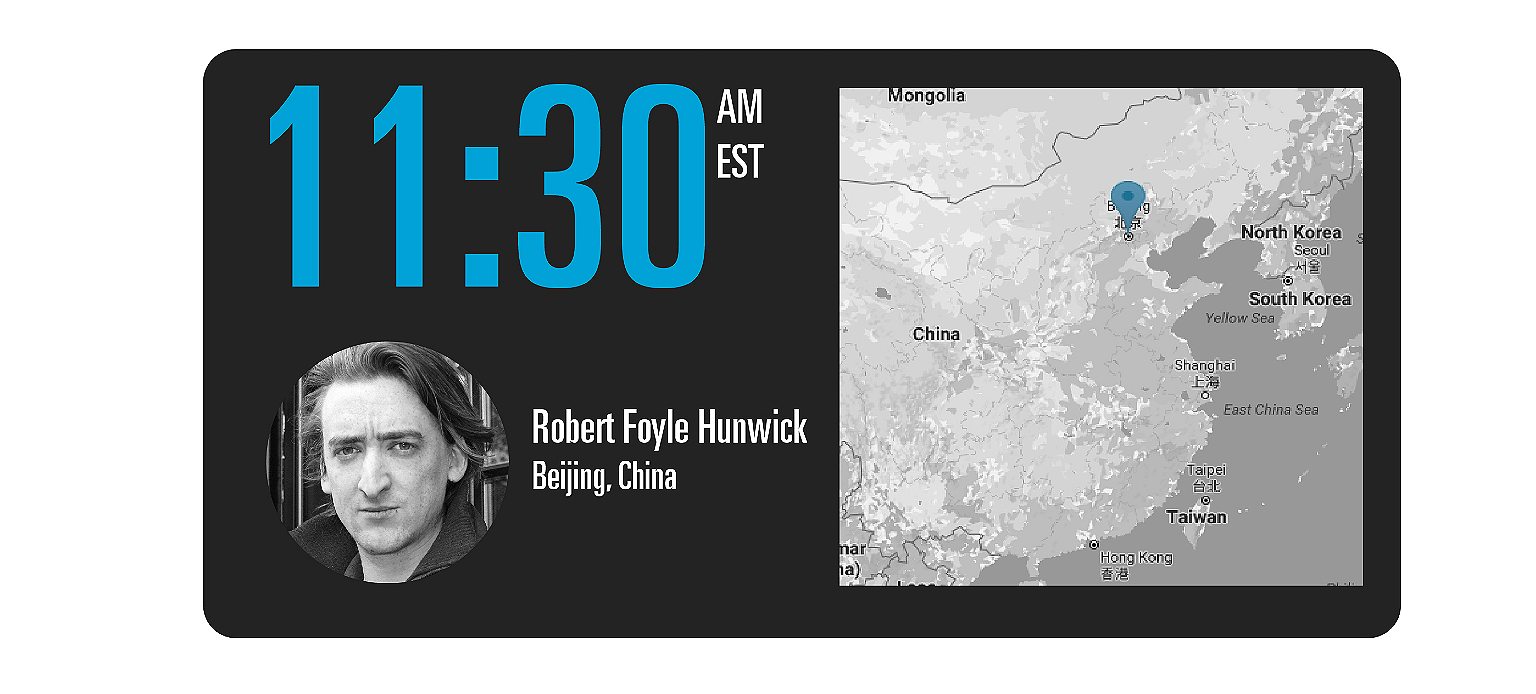
Democracy emerged stillborn here in China some decades ago, so what better place to watch the dwindling of the Great American Experiment than in the cradle of its rising antagonist in the East?
By 8 a.m., about 70 stakeholders had gathered at a sold-out pub for a comfortable seat to watch this thing burn with their fellow global citizens. “Remember how we all took shots after Obama won?” a Chinese-American friend reminded me last week. Glory days. The crowd this time was tense even on arrival. “Shut that door!” a man by the entrance barked at surprised latecomers.
There’s sympathy for Trump among some urban, middle-class Chinese who follow U.S. elections. The notion of a “rigged” system, of invisible networks holding back one’s ambitions, is recognizable to many here. And for certain nationalist youths and grouchy old leftists, who see America itself among the chief strands of the unseen bonds restraining China’s rise, there would be gleeful pleasure in the possibility of a political bonfire.
But, “Better to be a dog in peaceful times than live as a man in turbulent times,” as the Ming expression goes: the Chinese people and their leaders, with a long litany of wrecked dynastic glories and civil wars, treasure stability and order more than a Trump upheaval. As the count rose and Florida leant Republican, some turned to social media for assurance and others to the bottle. Having witnessed the Brexit under similar circumstances, I knew the feeling. I’d been there: Hunting for any possible outcome that doesn’t leave you slumped in despair at the bar with the staff genially asking if you want another. Drinking started relatively early over at the American embassy, I’m told.
Hearts jumped as Hillary took three early states in smart succession, but the gloom, only insidious before, started to really take hold around 10:30. “Who are these people!” someone yelled as Texas and Arkansas fell under the Trump Train. There’ll be a thousand hot takes explaining that soon. Others drifted off, heading to work with bombshell expressions. As the afternoon wore on, dozens more would abandon their official posts and trickle in, ordering beers with whisky chasers and shots on the side, staring at the screens in disbelief.
At 1 a.m., a man broke the silence that had shrouded the bar for almost an hour, screaming about a “racist, sexist president” and, of all things, “habeas corpus.” A smatter of applause greeted this incoherent rant: Everyone needed that. When New Hampshire, trailing for hours, suddenly displayed an 18-vote lead for Hillary, a lone voice cried “Yes!” But as the last bricks of the Clinton firewall fell apart in Pennsylvania, Michigan, and Wisconsin, an aura of aghast celebration took hold. A young woman’s Make China Great Again cap attracted shrieks of ghoulish amusement from several helplessly drunk patrons. Laughter in the dark? It sounded more like someone speaking truth to a new and terrible power.
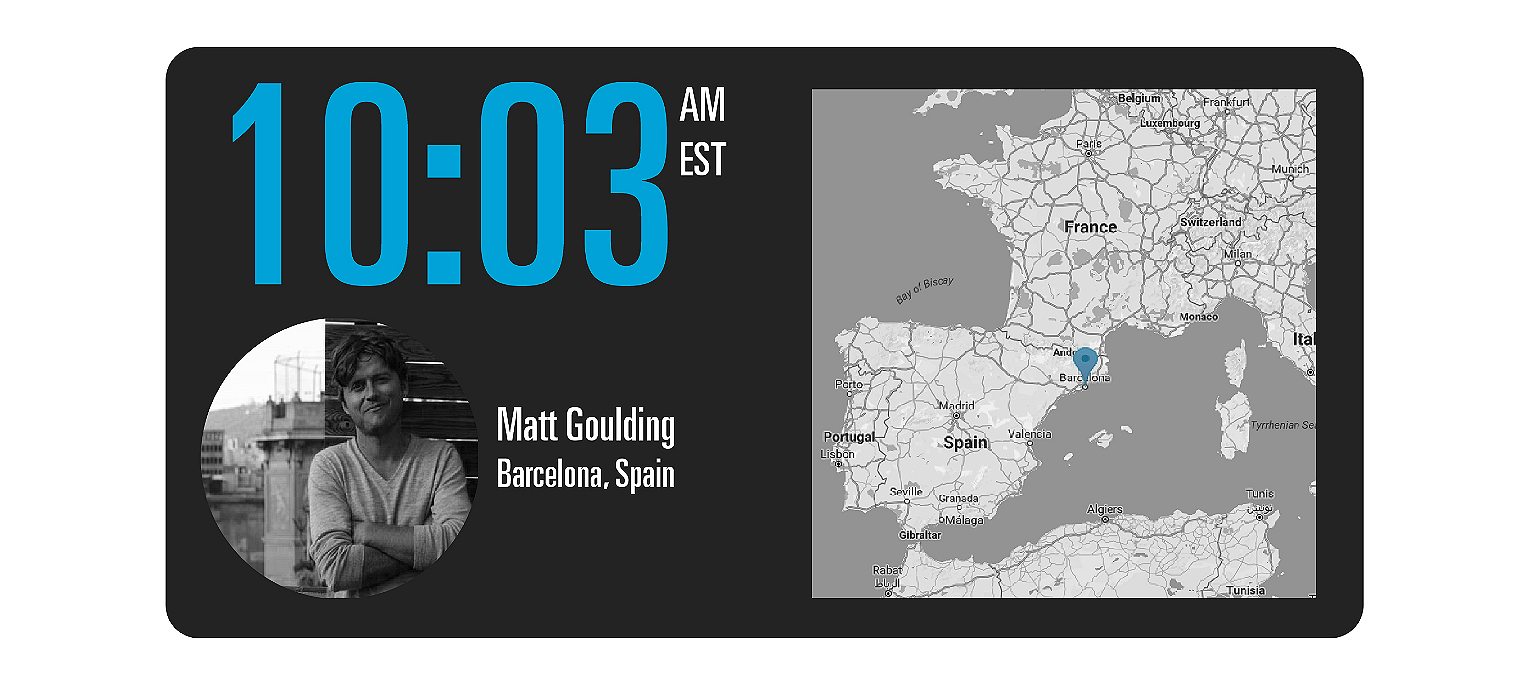
I wrote a draft yesterday. A version of this dispatch that read like a playful summation of an election day spent in my adopted home abroad. I was going to tell you about my morning trip to the Boqueria to buy the ingredients for our election night party. About the burgers and nachos and wings I made for a mixed crowd of Catalans and expats. I would remark on the running joke between a Floridian friend, a Pennsylvanian, and myself, a North Carolina voter, about how we would save the republic from 5,000 miles away. I wanted to tell you about the Trump dartboard my brother-in-law made, about the bullseye we carved in his throat, about the special punch I concocted—the Memory Eraser, an industrial-strength potion that would help us all forget about the past 18 months of pain, frustration, and embarrassment. I had it all planned out.
But that draft means nothing this morning.
At 8 a.m., right around the time Hillary makes the most difficult phone call of her life, my Catalan wife pulls the covers off the bed and gives me two options: “We can sit here in silence feeling sorry for ourselves, or we can take a walk and get all of this shit out into the open air.” I opt, reluctantly, for the latter. We start, as we always start, in the Gothic Quarter, on the stairs of Plaça del Rei, where Columbus returned in 1492 to announce to Ferdinand and Isabelle the presence of a strange new world to the west. One brimming with potential.
In Plaça Neri, we take in one of the city’s most potent symbols of Fascism. At the peak of the Spanish Civil War, Franco and his allies dropped a bomb here, right between a church and a preschool, killing 42 people, most of them children. A group of foreign tourists is gathered by the façade, some running their fingers through the pockmarks left by the explosion. “My parents grew up in a very different Spain,” says the young guide. “I sometimes wonder if we see the same country.”
Next, we stop in La Plata, a place normally reserved for Saturday mornings, where a few porrones of white wine work to wipe clean the residue from the night previous. But considering the scope of this historic hangover, a Wednesday morning stopover feels appropriate.
In the end, I must work. I hope my fingers can make sense of this mess in a way my head and my heart cannot. But I can’t face the friendly souls at my normal coffee spot. Instead, I sit in the corner of a bar a few blocks from the Rambla, afraid to make eye contact, unable to speak out of fear that the people around me might hear America in the cracked syllables breaking on their way out of my mouth.
I take some small and selfish measure of solace in knowing that I live in Barcelona; even before this election, I had no plans to return to the U.S. anytime soon. But this election was never about me. I am a white American male with disposable income. The world imagined and espoused by our president-elect doesn’t threaten me in any specific way. But it threatens most everything I love about the country I left six years ago. And I fear that if I one day decide to return, I will no longer recognize the home I left behind.
Regardless of your politics, for any American who has traveled during the last two presidencies, you may have noticed a change in the tone and tenor of your conversations with the people you meet along the way. In the early 2000s, I danced around politics, apologized for the president and his policies, made an extra effort to confound stereotypes and assure those that I met that there were tens of millions of Americans who believed in a different world than the one pursued by our leader. But over the past eight years, the conversation has changed entirely. I dropped the defensive tone, had substantive discussions about the new world order, enjoyed a few moments of genuine patriotism along the way. The conversations I will be having these next four years will no doubt be the most painful and challenging I’ve ever had as a traveler.
Today will be the day of a million obituaries. An endless stream of post-morts. The pundits and editorial writers will be fierce and heartbreaking in their assessments. Arcs of justice bending, amber waves of pain. Facebook and Twitter feeds will read like encyclopedias of heartbreak and fear. Autopsy reports will attempt to make sense of the corpse of the republic, the broken body of the American experiment.
From the quiet corner of this lovely café, the scope of this news hits me in waves. There are the practical concerns. What does it mean for the Supreme Court vacancies? How much harder will it be to get Laura a green card now? And then there are the existential dilemmas. Are those 60 million voters really my compatriots? Is this the end or the beginning?
I worry about my family, my parents who invested so much time and energy in this outcome. My brothers and their beautiful young girls, who are just old enough to know that the world is better without walls. My friends, who spent last night sending increasingly desperate text messages about the logistics of Spanish visas.
More than anything, I worry about my wife, who loves America as much as anyone who insists it must be made great again. More, actually, for hers is not the love of a patriot or a partisan, but the love of someone who sees in the United States an imperfect but beautiful expression of the world’s boundless potential.
When I see her again, when I drag myself off this stool and stumble home to pick up the pieces of our life, I will say that I am sorry that we let her down, and that I hope when all of this is over, there will be something left for her to love.
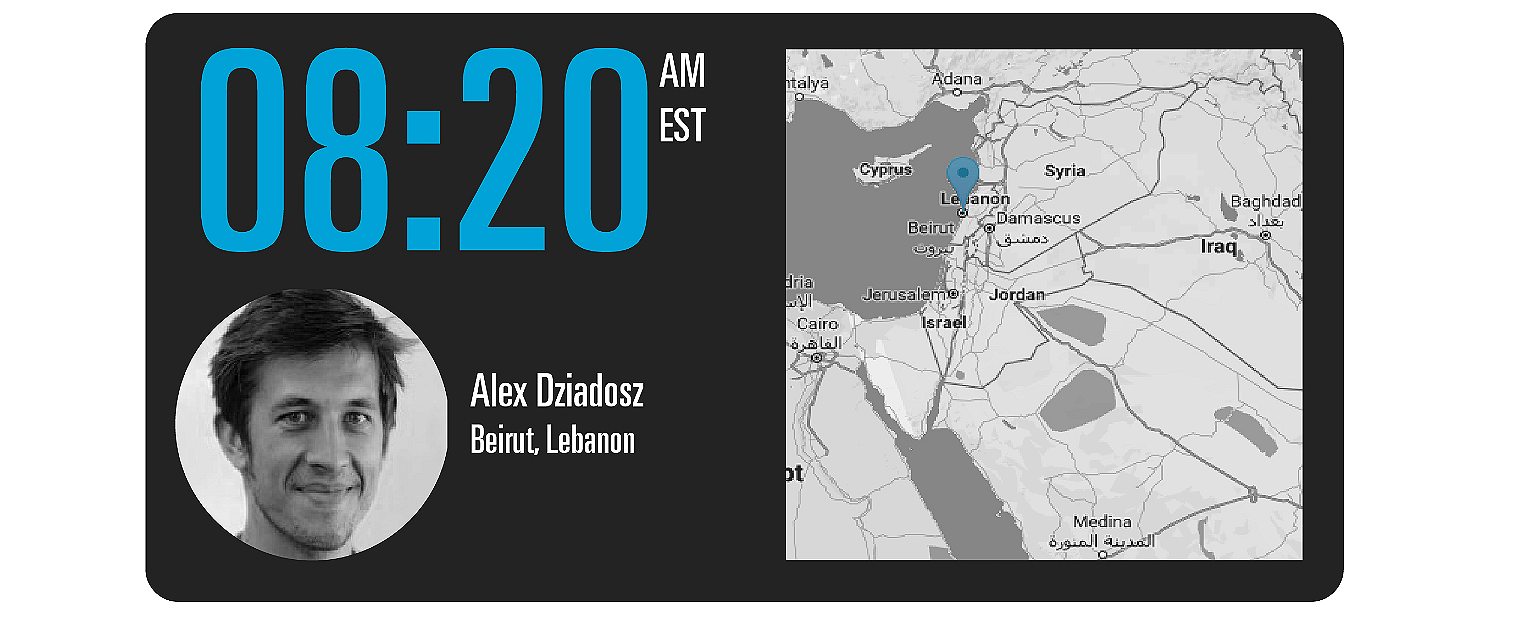
I was planning to write about how the news coverage here, in Beirut, has not been dominated by the U.S. presidential campaign over the last week, but instead by the election of another president: Lebanon’s, after the country endured two and a half years without one.
I was planning on writing about how a political stalemate between the major sectarian-rooted parties had kept any consensus candidates from getting the votes they needed to win the presidency all this time, strangling the government’s ability to address problems like the fact that the country’s trash collection system had broken down and it has been literally choking on its own filth for over a year.
I was planning on writing about how the man who won Lebanon’s presidency was the very man everyone said would never make it, but who simply would not go away for so long that he eventually did: The 81-year-old Michel Aoun, a former Army general who led a rebellion against Syrian forces near the end of Lebanon’s 15-year civil war, fled the country, and then came back and reintegrated himself into politics by aligning himself with Syria’s main allies in the country.
I was planning to include a line like, “If this isn’t a sign that those who are unscrupulous and violent in nature win out in the end, as long as they persist, then it is hard to imagine what is.”
I was planning to talk about how a Syrian friend, before results started coming in, told me over dinner, “Whoever wins, we’ll still be living in shit. As Syrian citizens, we’ll be living in shit no matter what,” and about the general sense of malaise that had settled over the region in the years since Obama’s Cairo address.
I was planning to write how, before the results started coming in, I went for a run, and how strange it seemed that life was proceeding as normal: That the wealthy were shopping at luxury stores and watching films at new cinemas while everything seemed to teeter, so clearly, on the brink of ruin.
But what is ruin? For many, here, ruin came long ago. Ruin is familiar. Ruin is something some have weathered, and which has destroyed some. The ones who have been destroyed are in general forgotten, and the rest move on.
I was planning to write about all of this, but, like everyone else reading this, I’ve been trying to figure out what to do next, and there isn’t enough time to get into it all.
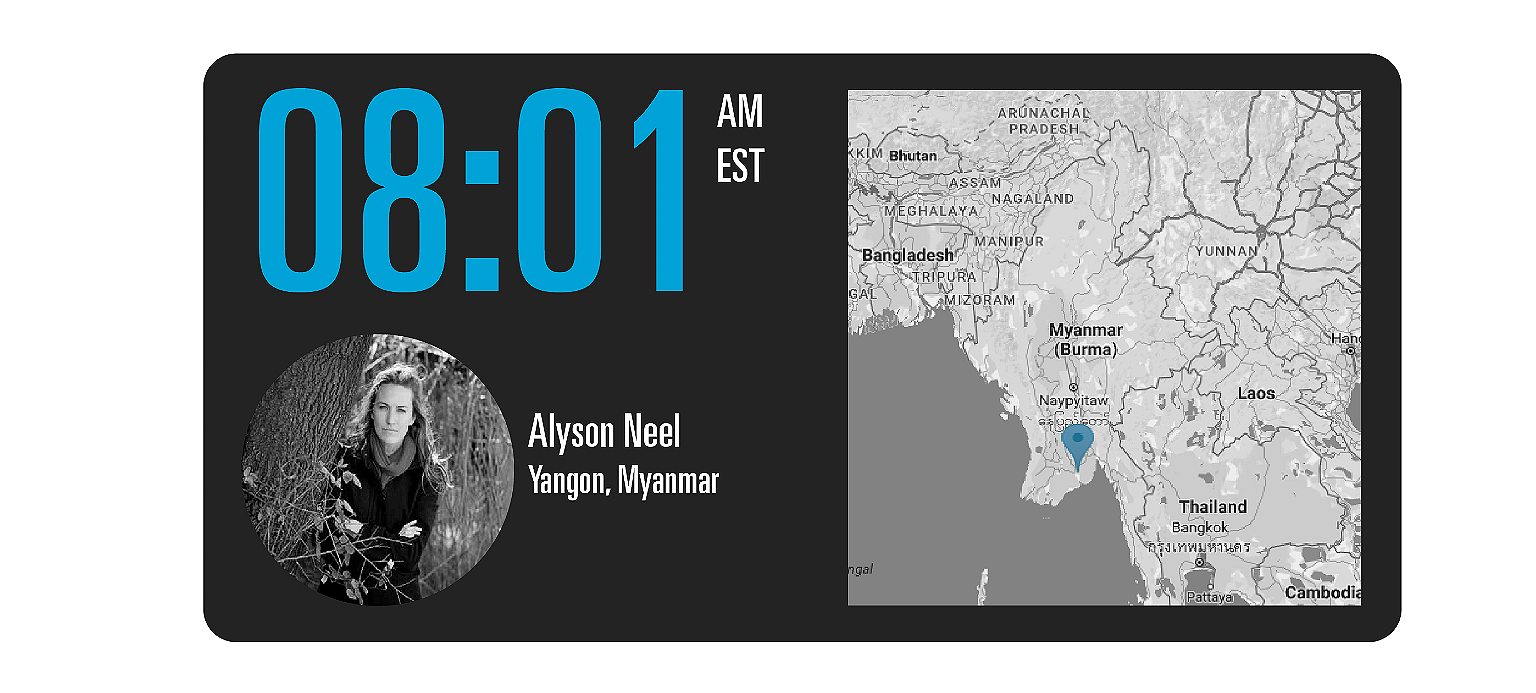
Large glass of mediocre Cabernet in hand, I cast my ballot at a pub in downtown Yangon.
It was the night of the final General Debate—well, we in Yangon were watching it the following night—and spirits were high, buoyed by generous Happy Hour prices. Just like last summer when I watched one Republican primary debate at the Trump Tower in Midtown Manhattan, it was fun until it wasn’t. On the projector, Trump asserted the law permits doctors to “rip the baby out of the womb” days before birth. The room grew quiet. Several of us beelined for the bar.
Nearly every time a Myanmar citizen learns I am American, the response is some variation of: “Ah, USA. Very good. Obama!” (“Obama” is usually shouted.)
There are a few exceptions.
“Trump or Hillary,” a gruff voice demanded.
I was mid-swig of my first cup of coffee, enjoying a perfectly lovely breakfast in perfectly lovely Hpa-An, the capital of Kayin State in southern Myanmar.
Amused, I responded: “Trump or Hillary?”
“Trump. Sometimes we need a strong man to get a nation back on track.”
He told me possession of most weapons in Yangon, where he’s from, is illegal, immediately after which he asked me if I’d fancy a M-16. He even quoted prices. I’m no assault rifle expert, but they sounded realistic enough.
As I made wide eye contact with the waiter and lifted my already empty mug, the Yangonite left me with some policy advice.
“I have the solution to mass incarceration in U.S.A. It is very simple.”
I paused, nervously, and looked around. Where was that coffee?
He lifted his right hand, his index finger pointed straight at me, the other fingers curled backwards into a fist. He pumped his thumb repeatedly: “Pow! Pow!”
****
Last night, on my way home from work, I hit up my local pagoda. Despite being raised Catholic, I am not a religious person, but at this point it couldn’t hurt, right? In the stillness, I imagined millions of my fellow Americans waking up, many of them heading to the polls. Three of the four local pagoda visitors I showed photos of Clinton and Trump to had no idea who they were; one woman recognized Clinton.
I hailed a cab home.
“Where you from?” came the familiar greeting.
“U.S.A.”
“Obama! Very good.”
“And where are you from?”
“Rakhine State.”
He told me his name is Zawmin, and he and his family are Muslim Rohingya, often called the most persecuted minority in the world. He said he is not allowed to go home, and his family, back in Rakhine, is not allowed to visit the neighboring village, let alone him in Yangon. “Martial law,” Zawmin explained. “The situation is not good. There is no equality here, between brother and sister, between languages, between religions.”
I mentioned it was now Election Day back home, and asked whom he supports.
“Hill-ar-ee!” Zawmin is the most enthusiastic Clinton supporter I’ve found yet in Myanmar. “She and Daw Aung San Suu Kyi are friends. They are both good for Myanmar; they want peace.”
When I ask if he’d heard Ashin Wirathu, the head of Buddhist hardline nationalist group Ma Ba Tha, had officially endorsed Trump via Facebook, Zawmin nods quietly. “Trump and Ma Ba Tha move both of our countries backwards.”
****
I was checking out at CityMart when I noticed the young man behind me wearing a white T-shirt that read in big block letters: Donald Run. I froze, bag of groceries in hand. Surely, the manufacturer forgot a comma, but what did it mean? Was he pro or anti Trump? After awkwardly waiting by the escalator, counting and recounting the number of items in my bag—1, 2, 3, 4, 1, 2, 3, 4—I led with:
“Hi. Sorry. I have a question.” Note to self: work on Myanmar small talk. “What does your shirt mean? Are you for or against Donald Trump?”
“Who?” he looked confused.
As he walked away, I saw on the back of his shirt was a cartoon of Donald Duck.
For many in Myanmar—a fragile democracy undergoing significant political changes but still wrestling with immense poverty, the highest infant mortality rate in Southeast Asia, and continued ethnic strife, among many other issues—this election is not a major preoccupation.
“Ordinary Burmese people don’t really care who wins,” one Myanmar journalist told me. “They believe they won’t feel any impact. It’s just too far.”
****
It’s 11:30 a.m. and I am at the same downtown bar where I cast my ballot. I’ve been here for four long hours, along with several dozen expats.
There is palpable anxiety in the room. The bar erupts in collective cheer, then collective groan, then collective silence. Fewer rounds of Americanos and increasing numbers of beers and Bloody Marys circle the room.
A few families have taken their children out of school, hoping they would witness a historic moment together. “What happens if he wins?” one red-headed boy asks while having his cheek painted with the emblematic “H.”
A Filipino expat empathizes with a few especially grim Americans: “This is how many of us felt when [Rodrigo] Duterte was elected.”
My iPhone, now at 15 percent battery, beeps with another message, this time from an American expat traveling in Shan State: “Omg wtf is happening.”
After months of scouring Twitter, poring over transcripts and then watching tapes of the debates, I realize it is the first election event I am watching here in Yangon in real time.
And while I stress-chew on a vodka-marinated olive as the election results trickle in—increasingly doubting Myanmar astrologers who one-upped Nate Silver back in August and predicted a Clinton win—I think of my family, friends and fellow feminists Stateside, and I think of Zawmin, who told me as I left his cab tonight, “I will be watching, too.”
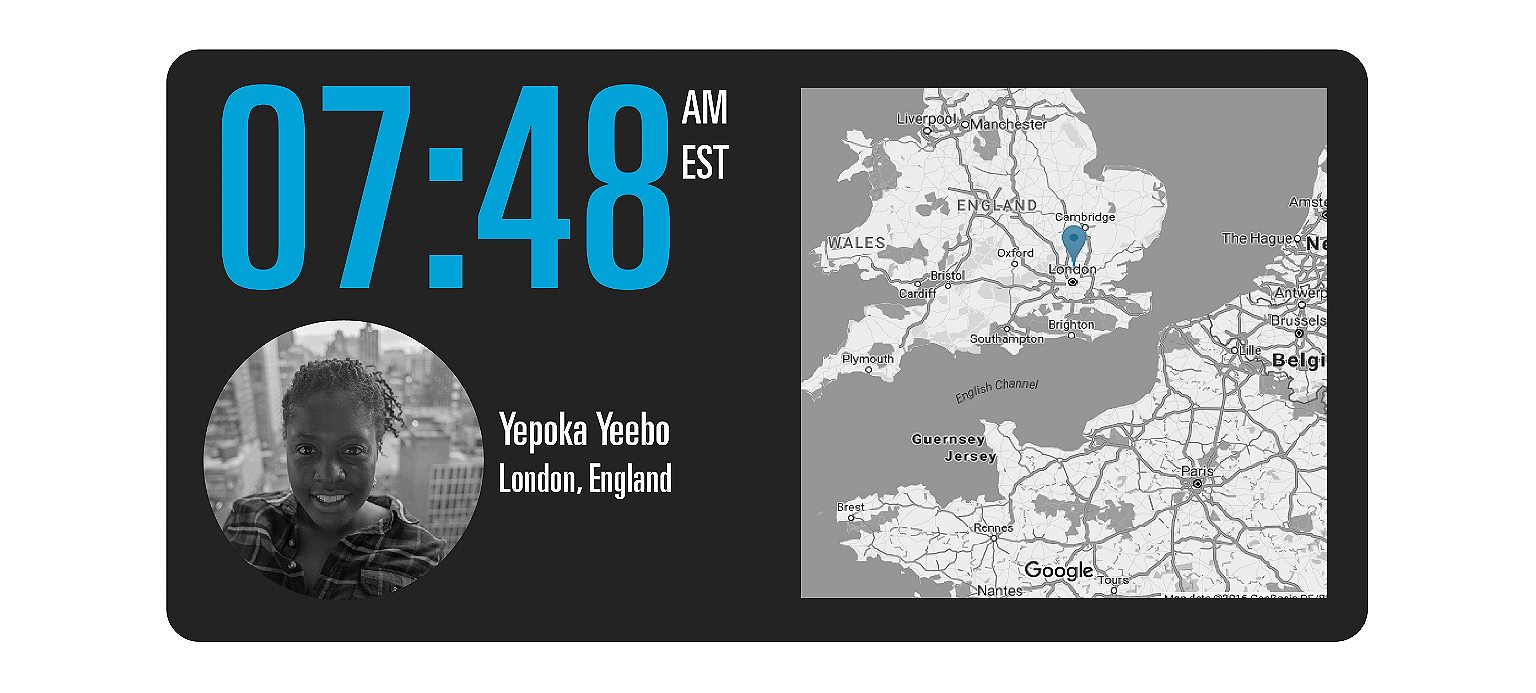
We tried to warn you. We told you the polls would be way off. We told you people would vote in surprising ways. We told you some of you wouldn’t recognize your own country, and others would recognize it all too well. Donald Trump called himself ‘Mr. Brexit,’ for Christ’s sake. And still.
This morning, the streets of Brighton were slick. It had rained all night, and the wind coming off the English Channel kept buffeting the grand but decrepit Regency-era buildings in my neighborhood. At some point, somebody had braved the storm to spray-paint the words ‘sad times’ in huge black letters on the immaculate primrose wall of a newly renovated house.
On the main road, there were dozens of snatches of conversation about how it happened exactly like the Brexit. How the moment they called Florida was exactly like the moment the results came in for Sunderland, the first town to return a ‘yes’ result in the referendum about whether Britain should leave the European Union.
In one coffee shop, locals greeted each other with exasperated looks and the words ‘fucking hell.’ But, like the morning after the Brexit vote, a lot of people were sure that it would be all right in the end. Keep calm and carry on. Nothing much would change.
Except it already has. We haven’t even started the process of leaving the European Union, and the currency’s tanking. The economy’s slowing under the weight of all the uncertainty. Friends and family are picking up and moving halfway across the world. Newly emboldened fascists are randomly attacking people in the streets.
The most unsettling thing is that in retrospect, it was not a surprise. We knew that huge swathes of the country were angry about laws they felt threatened their way of life, and suspicious of the elite, and threatened by foreigners. Tabloid newspapers, TV pundits and politicians had been stoking these fears for decades. We were warned. And now it’s coming for you.
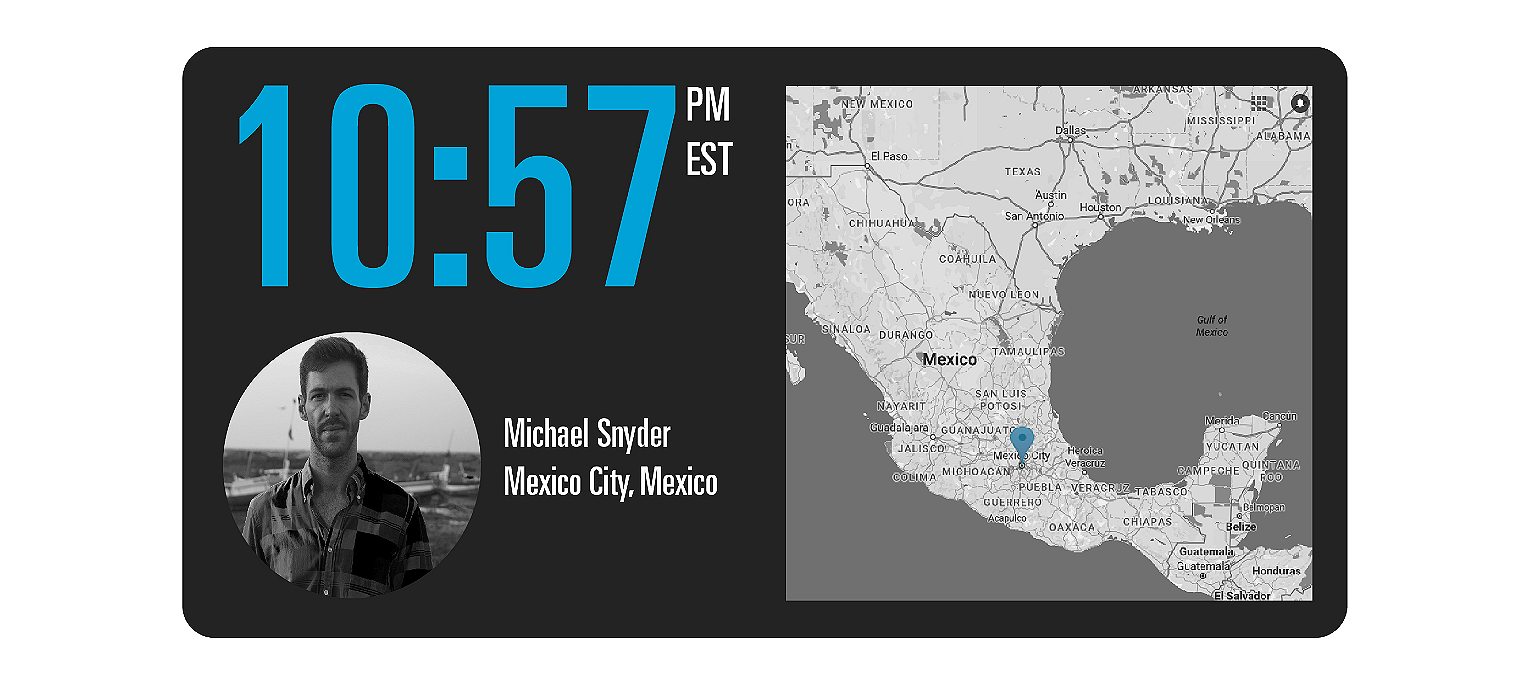
The American Legion Bar in Mexico City is straight out of a Graham Greene fantasy: dark-wood wainscoting, lighting dim enough to hide your secrets, and a bar stocked well enough to drown all sorrows. A woman wanders in wearing an A-line dress and beautiful black pumps, accessorized with a rakishly shabby, white-haired husband. It’s 5:30pm and the front room – the only one with reasonable lighting – is already half full with nervous-looking young gringos, laptops fired up.
I snag a seat in a dark room near the entrance. A giant catrina (the stylized skeletons that pop up all over town during Day of the Dead) looms nearby, decked out in a black and purple gown, a wide-brimmed black hat obscuring her fleshless, papier mache face. A woman, which seems a good sign; a dead one, which…well, maybe less so. After more than a year of this bullshit, I’m With Her.
By 6:30, the place is full. Trump, at this moment, is in the lead, which doesn’t mean much, but the catrina is hiding anyway, tucked away now behind the door. I’m sitting with a pair of Australians, whose own democracy involves mandatory voting and, as I’ve only just learned, something called ‘Democracy Sausages’ (in their hipster-type neighborhood of Newtown these will, apparently, sometimes come ‘wrapped in haloumi,’ which sounds like a better incentive to vote than the threat of a fine if you don’t).
There’s a camera around for some reason, operated by a guy with ratty gray dreadlocks and cargo shorts, filming something or other. Whatever it is, it involves a crowd of young people shuffling around, not at all nervously. Optimism is understandable. Here, as in Maryland (where I grew up) and New York (where I went to school), you’ll be hard-pressed to find a Trump supporter. You may be hard-pressed to find a Republican. But then, I’m from the Negative-Nancy U.S. East Coast, and half Jewish, to boot, so optimism makes me nervous. It seems unnatural. It seems like asking for trouble.
Still, it’s calm here. Everyone has a beer. Faces are bathed in a flickering TV glow. No one is considering the unthinkable. The camera is on and people are laughing because that’s what we’ve been doing all along, isn’t it?
In any case, a mezcal-and-beer is only 85 pesos, under $5 – so whatever happens, maybe we’ll be fine?
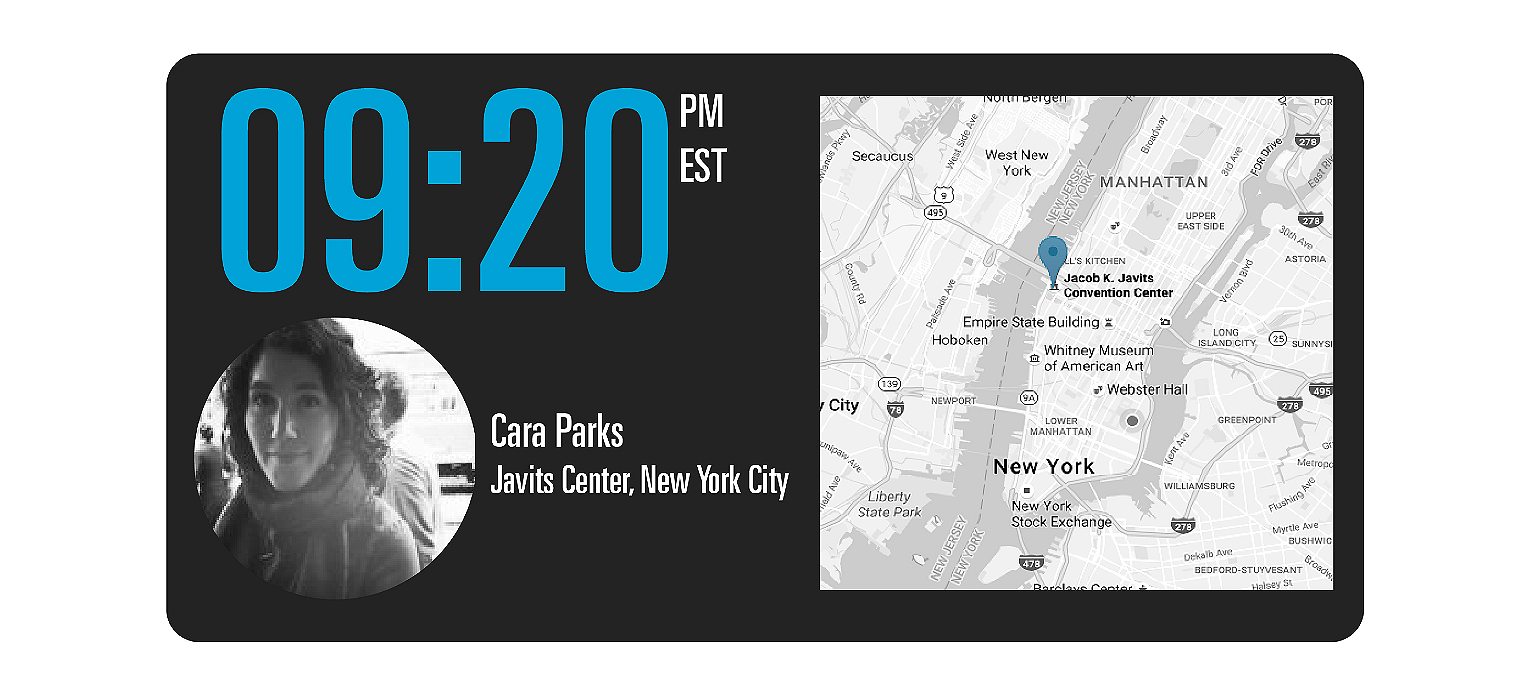
The line to enter the Javits Center on the west side of Manhattan is vast; an ocean of people are attempting to squeeze through security cordons and enter the arena from which Hillary Clinton will address the nation tonight. “A Beach Boys concert is more organized than this,” grumbles an elderly woman beside me.
Inside, people swarm the concessions area, which is mostly serving granola bars and massive troughs of lasagna. People are buying heroic armfuls of tepid beers and stand nervously around cafeteria tables, pounding single servings of bad wine and staring at the television screens promising breaking news but so far, only announcing that state after state is too close to call. When North Carolina looks to be leaning toward Clinton, a cry echoes through the building, bouncing off the much-vaunted glass ceiling. When Florida reports at 50 percent for Clinton, the crowd collectively loses its shit. The glitter-spattered young woman behind me is singing along with Katy Perry’s anthem “Roar” while everyone over 27 stands awkwardly around her.
The crowd is shifting from cautious optimism to celebration. The drinking is shifting from therapeutic to joyful, and people are planning their post-decision revelries.
At the Javits Center, the crowd continues to teeter between joy and panic. “How can it be this close?” a young woman opines, staring at her phone dejectedly. A video of Obama starts and the crowd goes wild. “We miss you already, Obama!” yells the newly energized glitter girl. A man in a Muslim prayer cap pushes toward the front of the crowd for a better view. He is holding a piece of paper with the name of every state on it and the number of electoral votes each state carries. He taps on the shoulder of a young black woman and they gesture over the paper, determining which states have been called and which haven’t. “Marco Rubio won? Fuuuuuuuck,” laments a young man to my right. The pledge of allegiance is read, and he whispers to a friend, “Is this one that you hold your hand on your heart for?” She doesn’t know. He does it anyway.
I biked all over my city today while voting, working, and attending this event. Past the street, closed to traffic, on which Donald Trump is holding his own election night event. Past the Jewish delis in my own neighborhood leaking the scent of fresh bread in lower Manhattan and through the slightly sweet smell of roasting pork in Chinatown. Past nail salons and bars offering election specials and lines of people waiting to vote. Past a man blaring a song that featured the lines “Hillary in jail, Hillary in jail,” again and again over an admittedly pretty sick beat. Past legions of police officers pressed into service for the night’s festivities and the Empire State Building lit red, white, and blue for the election. I am surprised to see both campaigns descend on my city tonight, a city that has so often been pilloried as not representing “real America,” as being outside the lexicon of Americana. But here we are, with candidates from both parties hunkered down on this island while they wait to hear their—and our—fate.
“It’s too early. It’s too early to … yeah, it’s too early. 2012 was close, people forget that,” says the woman beside me, brow furrowed.
“Yeah,” her friend says. “But I’m feeling that Brexit dread.”
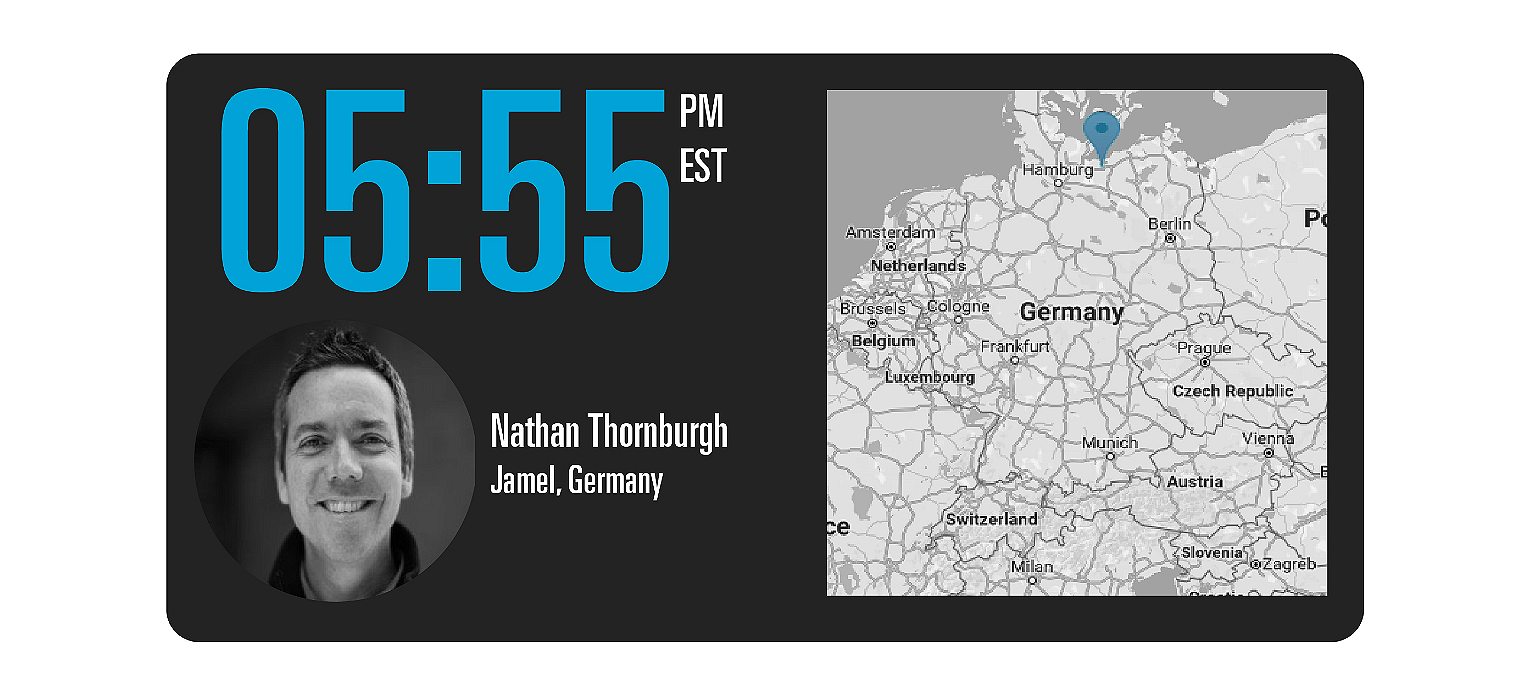
The snow started before the sunrise today, first a thin layer and then as the day warmed, an unstopping downpour of thick, wet snow that clung tightly to everything. By 9 a.m. it was sticking to the neat Prussian rows of trees along the country roads. By the afternoon branches bowed and broke under the weight. In the settlement of Jamel—northern Germany’s infamous Nazi village—Bennet Rückert was clearing the snow off the window of his blue van and answering questions from a half-Jewish American reporter.
Me: “Have you heard much from the US election?”
Rückert: “Of course. They play that shit on TV every night.” His daughter—maybe six years old, waiting for her brother Odin to come so they could build a snowman—looked up at him.
Me: “So you’re not for Trump or Clinton?”
Rückert: “You know what America’s problem is? Too many Latinos, too many niggers, too many Gospel-heinies.” He walked away. I winced at his adorable daughter and crossed the street.
These are fragile times in Germany. The kind of racist dog whistles and foghorns that Trump has brought into the open would have been unimaginable in German public life even two years ago. Now it’s all mainstream. Jamel is an outlier, a national shame ever since a group of outright Nazis bought up almost all of the houses in the village and tried to turn it into something of a Nazi no-go zone. But the northeastern state it’s located in, Mecklenburg-Vorpommen, is flashing some brown itself. In a recent election, the ulta-right-wing Alternatives for Germany party came in second with over 20% of the popular vote. This is Angela Merkel’s home district and her compassionate conservative CDU party came in third place. As someone smarter than me once said: History doesn’t repeat itself but it rhymes. The boisterous white nationalism behind the election result shares some genetic material with the 2016 US Presidential election and the fetal stages of the Third Reich alike.
I was not in Jamel to gawk at Nazis, though. I came to visit Birgit and Horst Lohmeyer, who are the heroes of this story. The Lohmeyers moved to Jamel 12 years ago from the “leftist biome” that is Hamburg’s St. Pauli district. They just wanted a place to make art and breathe fresh air. But when the Nazis—real-life Nazis with criminal records and Hitler license plates and an addiction to SS fonts on their street signs—began to take over the village around them, the Lohmeyers didn’t run away.
They invited outsiders to garden tours, they had artist openings, they shamed the government for allowing Nazis to take over a little piece of Germany. They started a summer rock festival that last year brought 1,200 people a day to this 40-person village. Despite threats and slashed tires and a 2015 midnight arson attack on their barn that came close enough to the house that it was more like attempted murder, they have stood firm. Just last week someone emailed them using the alias “Schindler Family” and offered to buy their house “while they still could.” The Lohmeyers shrugged it off. “We want people to see us: we’re still here, we’re not scared, we’re not giving up our land,” says Birgit.
This is the lesson they have for us after the US election: no matter what happens, stay engaged. Don’t let people look away. Call the bad guys on their lies, call the good guys on their complacency. “This village is already lost,” Birgit says. The rest of the world is not.
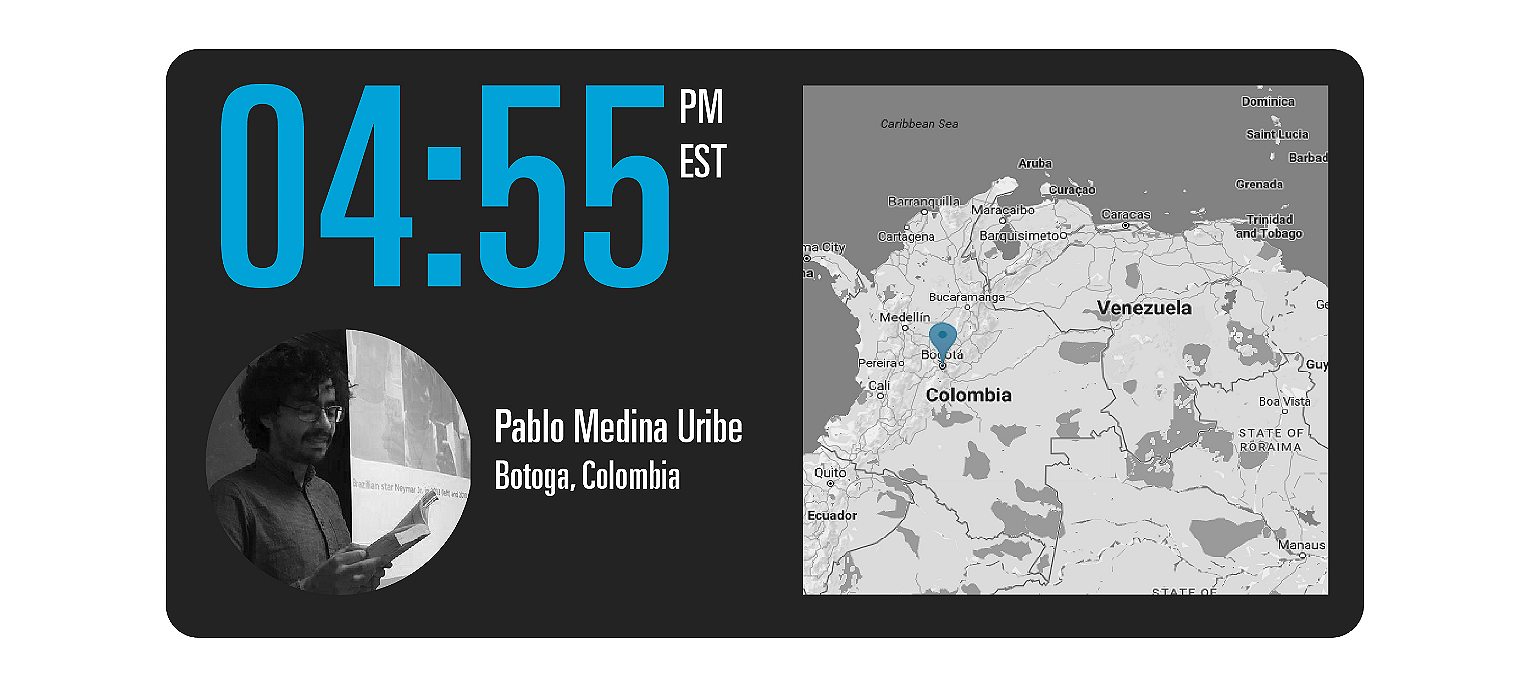
It’s lunchtime in the part of Bogotá’s Chapinero that is known for its restaurants, the neighborhood where my family lives. I head out for some tea and I overhear a young kid in a suit telling another one: “Are you ready for the Apocalypse?” He doesn’t seem to be ready. They are talking about the U.S. election, of course.
El Tiempo, Colombia’s biggest newspaper, has the Clinton-Trump race on its print cover (it also has a special section on its website). El Espectador, Bogotá’s other newspaper, opens its print edition with the case of displaced indigenous people in the west of Colombia. But on its website they feature a video in which they ask random people in Bogotá who would they vote for if they could do so in the United States. Almost all of them say Clinton either because “Trump is a fascist” or because “Clinton’s proposals are more ‘centered.’” Overwhelming victory for Clinton in Bogotá, 11 people to one.
Four years ago, when I still lived here, the U.S. elections were not so ubiquitous. I sat alone in my bedroom all day, following cable news and Twitter feeds that reported on the Obama-Romney contest, just out of curiosity.
Now our home has changed. My sister lives in Europe and I’ve moved to New York. The neighborhood has changed, too: the number of restaurants has about doubled and their prices are not too far from prices in New York. There is even a Starbucks, and people go there, despite the offerings of cheaper and better Colombian coffee around here. Maybe people come here for the free Wi-Fi, like me.
In the Starbucks, as in most of the neighborhood, is not uncommon now to hear people speaking English with American accents. I overhear two American women discuss over their laptops how they mailed their votes weeks ago and how they hope they made it to their home states.
Last night my aunt asked me, “What is going on in the U.S.? Are you confident?” My sister has been WhatsApping me all day, too, asking for updates. They know that I’m renewing my visa, and that, while the process of immigrating to the United States is humiliating and dehumanizing enough, one candidate has promised to make this experience even more miserable. So they worry, and I do, too.
It has rained every day for the past two weeks in Bogotá, and the gray clouds are taking over again. People start to head for their offices and now I’m left eavesdropping to a conversation about what the National Liberation Army (ELN) guerrilla is demanding for their peace negotiations with the government. I was here a month ago when Colombians rejected a historic peace deal with the Revolutionary Armed Forces of Colombia (FARC) guerrilla. Back then the polls also favored the option I was rooting for: a yes vote for the peace deal. So we’ll watch cautiously tonight. Like in Britain, we know in Colombia that it’s not over until all votes are counted.
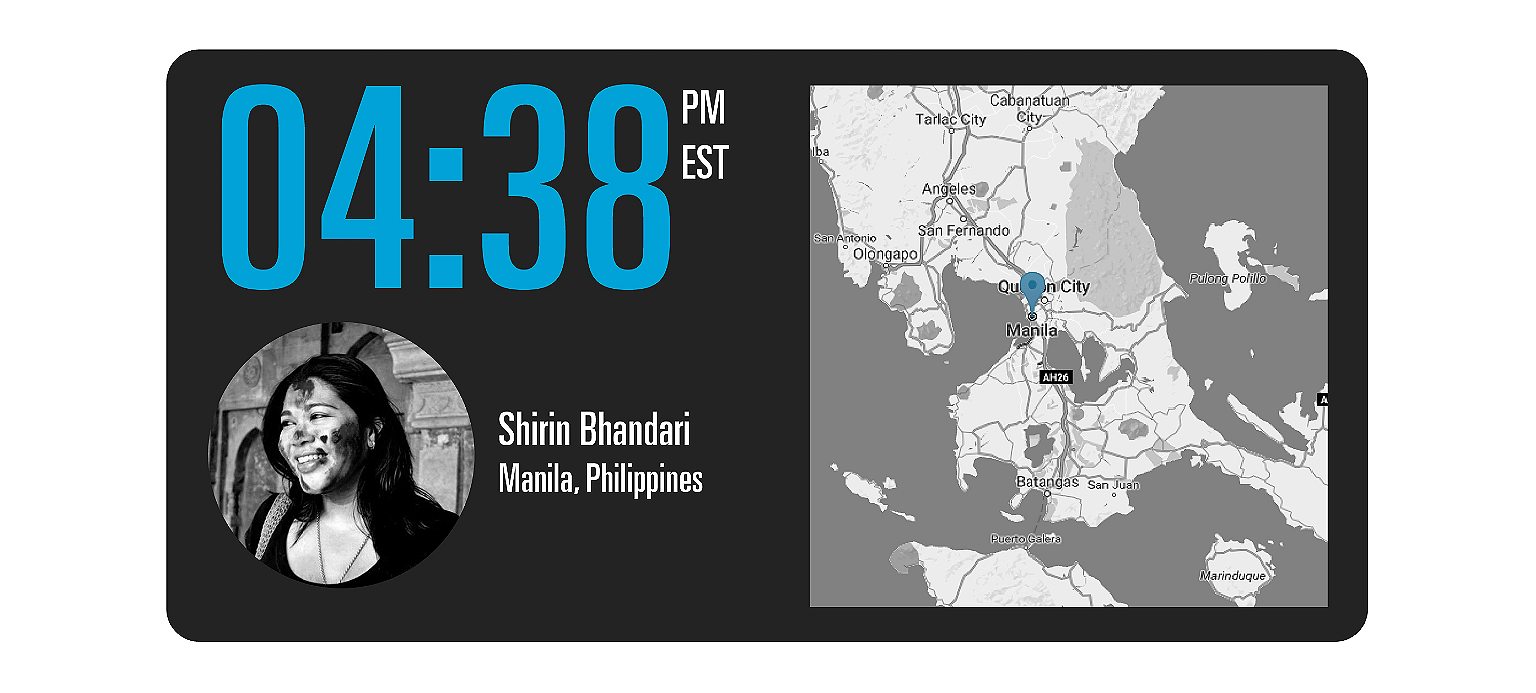
“Are you voting?” I overhear a Filipino friend ask the lone American in the bar. His jaw tightened as he held onto his craft beer. He was not keen to give us a reply. Alcohol and politics are not a good mix.
Had the question been presented six months ago about the Philippine elections, my reaction would have been the same. It felt like scraping candidates off the bottom of the barrel.
The large flat-screen TV was on mute. Prince was playing in the background. Gauging by the locals and expats in the dingy bar the intoxicated crowd have their money on Trump. The news aired about the killing of another mayor accused by President Duterte of drug trafficking. The mayor was arrested a month before and denied any wrongdoing. He was involved in a “fire fight” with the police and shot dead while incarcerated. The police claim to have found drug paraphernalia and guns in his cell.
Since taking office in June, President Duterte has pledged a bloody war on drugs, which has so far included 2,000 killings by police officers and vigilantes. None have been proven guilty in a court of law.
The sea of corpses shows no sign of receding. Despite this, he remains popular. The blue-collar voters who won him the presidency have shown no regrets. He has strained ties with the U.S. and claims new friendships with China and Russia.
There is an overall frustration with past administrations. The government’s inability to fight corruption, provide basic security and infrastructure led the Philippine public to demand a decisive leader. People who distrust their country’s judicial system and institutions were more likely to turn a blind eye on vigilante-style violence. The new norm is worrisome.
The loud incoherent rants, foul mouth, unpredictability, and lack of diplomacy and policy platform make Donald Trump eerily similar to the Philippine president. It’s uncanny. Like Duterte, Trump portrays himself as the working man’s choice. The sight of a microphone near either of them is enough to make one cringe. Both have a strong following and have managed to offend people from all walks of life; from human rights advocates to the Pope to other world leaders.
Across the room, pasted on a greying wall, is a paper that lists people’s names and bets on the duration of President Duterte’s term. A single bet made for the full run.
“You know if Trump wins, the only difference is, he won’t have his own death squad,” the American laughs.
“But I don’t even want to consider it.”
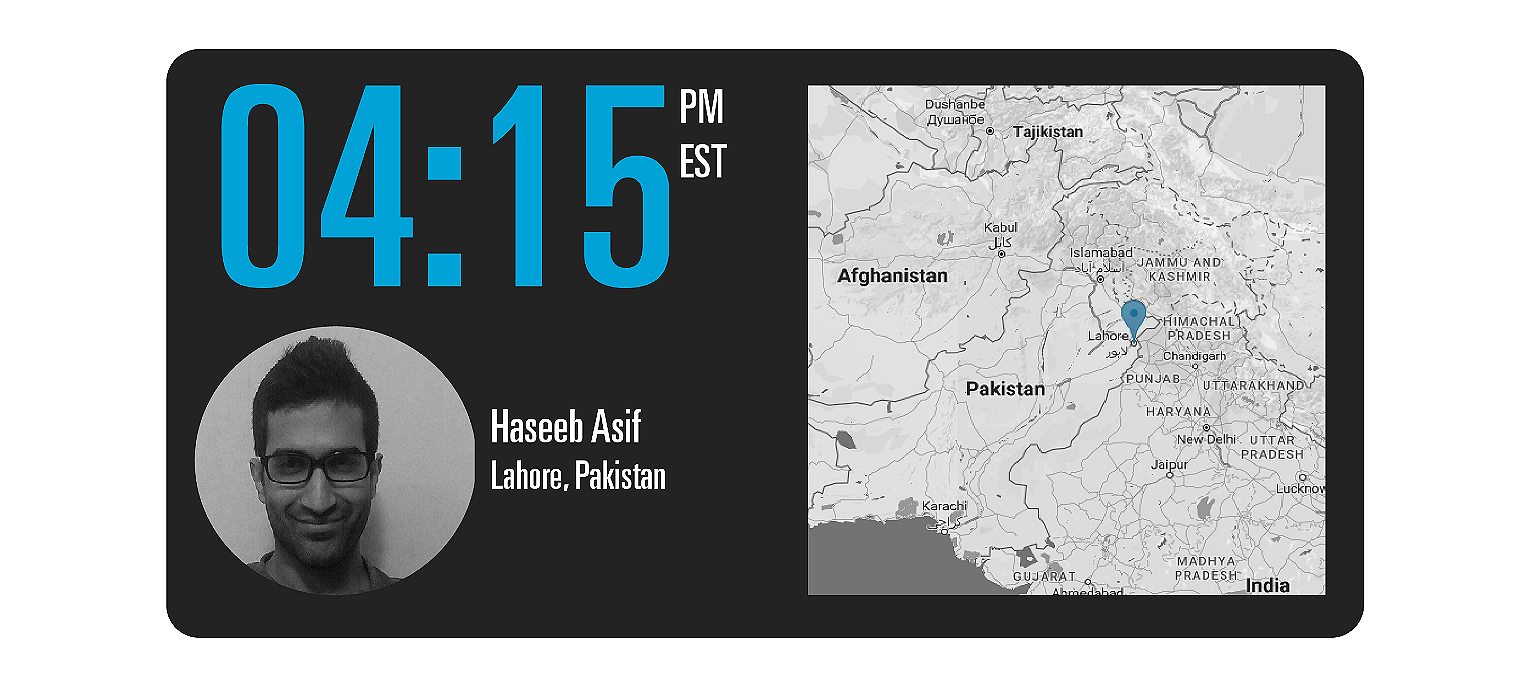
The native-language television channels are covering the American elections while debating the confusions of a public holiday tomorrow. There are cartoon caricatures of Donald Trump and Hillary Clinton brawling for the presidency. There are mock campaign posters in Urdu with Hillary in a headscarf and Trump in a traditional sherwani. The English-language papers are keeping hourly tabs, and pontificating on what it all means for Pakistan.
What does it mean for Pakistan?
In a third-story office in Lahore, with the awning windows showing the city enveloped in smog, a few friends meet with a bureaucrat who works for the Ministry of Foreign Affairs. “Nothing’s going to change for us, whoever wins. Nothing changed even after Osama. We will remain a weary ally, necessary but untrustworthy,” he says to a crowded room, hungry for debate.
Pakistan has had a tumultuous relationship with the United States. From the Soviet incursion into Afghanistan to economic sanctions following a nuclear detonation, from drone attacks to unserviceable amounts of dollar debt. It’s often been ugly, but never undiplomatic.
“I don’t agree,” says the banker whose office it is. “Whatever Trump will do will stay in America but Hillary might actually start the third world war,” he says in all earnestness. “Her largest backers are military contractors,” agrees a fellow journalist who keenly follows YouTube videos that expose America’s military-industrial complex.
“Nonsense,” says the bureaucrat. “If anything, Hillary has years of experience dealing with dignitaries. Her silver tongue will save America from pitfalls that Trump will jump face first into.”
These are the usual foreign policy and security related concerns. The kind a U.S. election always brings out in the War on Terror epoch. Then a voice from the back of the room says, “I just hope the negative campaigning doesn’t make life difficult for my brother.” The man’s brother is working as a software engineer in Arizona and is on course for citizenship.
That is where there is more than the usual concern in these U.S. elections. From those who send children abroad to study, from those who have immigrant relatives or who are applying for immigration themselves. The interest, in fact, seems to be more in Trump’s campaign than the election itself.
It started with Trump’s candidacy. Pakistan considered it a joke of course, like the rest of the world. But slowly, it became something real and something frightening. Surely he can’t kick out all Muslims? That can’t be constitutional?
Many Pakistanis already feel American foreign policy has stigmatized being Muslim in a post-9/11 world. You were either with them, or against them. And Trump just underscored that whatever them was, it was definitely not Muslim.
Last month, local press picked up a story about a Pakistani-American couple who moved back to Pakistan after their child was bullied at school for having a Muslim name. This is what Trump’s campaign has done, it quoted one of them as saying. If this is the future of America, we don’t want to live here. Another woman spoke up soon after to say she was considering rescinding her green card, even though America has been like a second home to her.
A friend of mine living in Boston, pursuing a Ph.D., is of the opinion that America needs a woman president right now for both sanity and posterity’s sake. She also points out that the two of us have a history with Hillary Clinton.
The college we went to in Lahore has a plaque which commemorates a speech given on the premises by the ‘First Lady of the United States’ in March of 1995. 21 years ago. Now, most everyone I know is hoping that she’ll be giving a speech as the President of the United States in another day’s time. Because the alternative is being made to feel unwelcome in one’s second home.
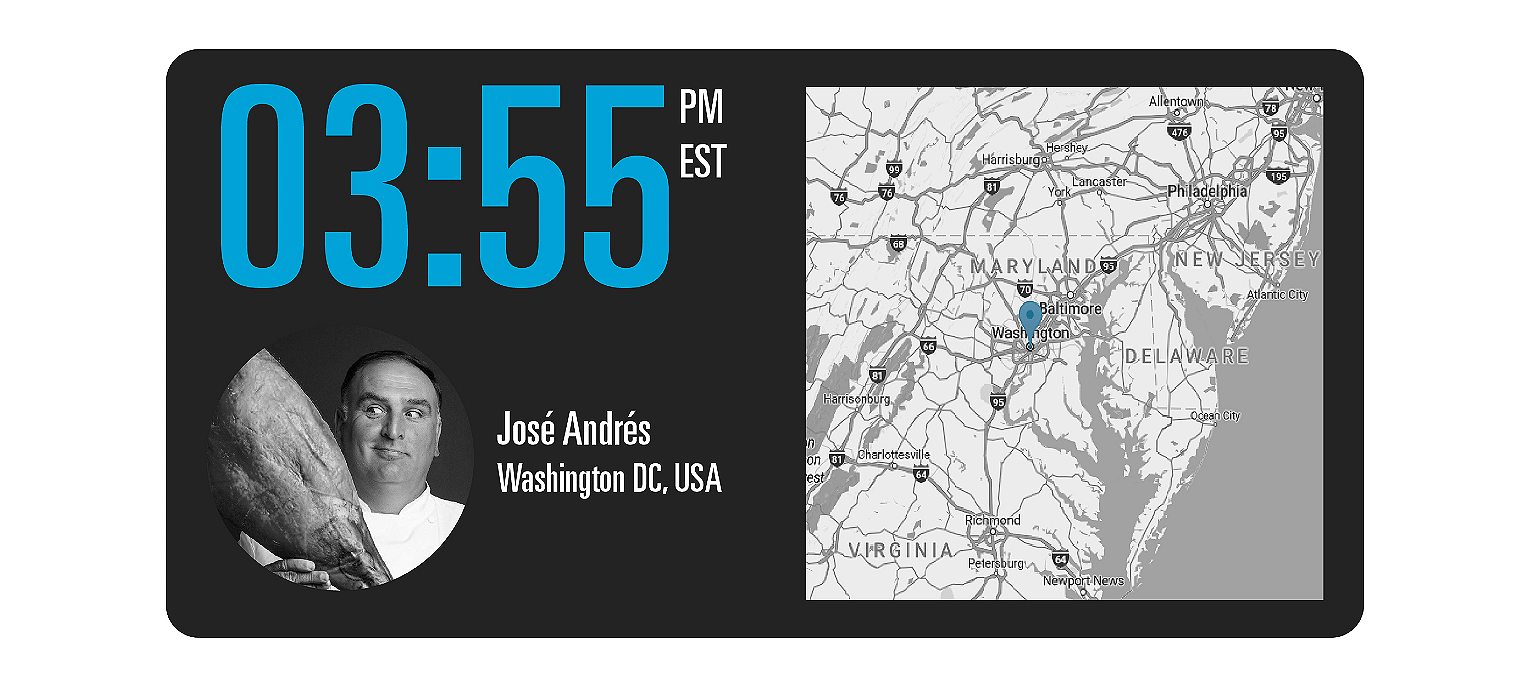
I became an American citizen on November 13, 2013. For a Spanish boy who left Barcelona at 19 in search of a new home, it was a big moment. For my wife and me, this is our first time voting for a president in the United States. And it couldn’t come at a more important time.
You may have heard, but Donald Trump is suing me for $10 million. So this election is personal. But not because of the lawsuit. Because I’m an immigrant, part of that huge group of voters that one of the candidates has spent the past 18 months subjecting to a firing squad of insults. He called Mexicans rapists, implied the only thing they do is bring drugs into the country, questioned the very contributions of the millions of immigrants that call this country home. I run 24 restaurants and employ more than 1,600 people in the United States. I remember every day what some people tend to forget—that this is a country of immigrants, built on the backs of immigrants. My choice is clear.
I voted early in my town of Bethesda, Maryland so I have the day to help out wherever I can. I read about the people across the country showing up to “monitor” polling stations with guns. I consider taking a jamón ibérico down to one of the precincts to do my own form of voter outreach. But there’s a long day ahead and a lot to do.
Every year around this time I judge a competition to find the best wine to pair with oysters. I know, I know, what do oysters and wine have to do with the election day? Just stay with me here. I show up late and need to work through 20 wines and a bushel of oysters in 20 minutes. My tasting partner, before he passed away this year, was Supreme Court Judge Antonin Scalia. He loved food, and this competition especially. He’d share stories with me about his pilgrimage across northern Spain on the Camino de Santiago. He may have been controversial for some, but for me he was always a wise man. America is the land of the unexpected, he used to say. Always be ready to seize the opportunity.
I run to my next appointment—a Spanish live radio show from my restaurant Jaleo. I’ve been more politically active than ever this year, and with the election upon us every radio and newspaper wants me to comment. An immigrant cook talking about a presidential campaign? My own little version of the American dream.
I stay glued to my phone. Like Trump, I can’t help but share with the world how I feel about these things. I send a Tweet. Then another. There’s a parody José Andrés twitter account out there, but whoever runs it really nails my feelings today: “People of America! Don’t fuck this up!”
I have the urge to do more. I sign up to make calls getting people to go out and vote. Five phone calls. No answer. No gain. I’m anxious. I consume political porn all day. Speeches given. Of love and hate. Dreams and nightmares. Another tweet. My feed is going crazy. One more tweet. Latinos may break 15 million votes. We are silent no more. “I will win the Latino vote” Trump claimed. No way, José. But I give him credit. He made the Latinos vote.
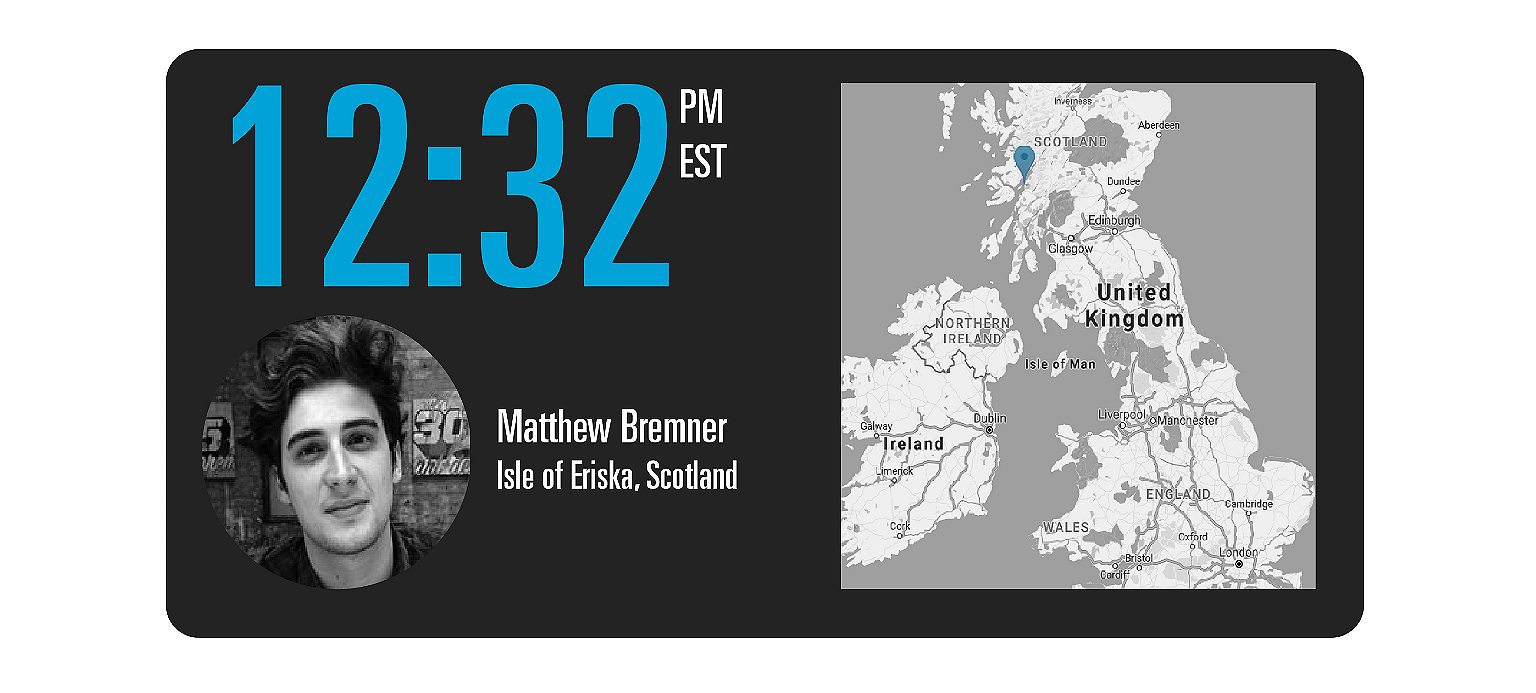
“I got a bit whacked last night,” the man grumbles in a clipped English accent.
“I know you did, Geoffrey, and you weren’t very nice to me either,” replies his wife sternly.
“Yes, whisky isn’t the most loyal of friends.”
Geoffrey looks down at his breakfast, his eyes clogged with sleep, his cheeks ruddy with excess. ” Bloody hell, I feel wretched,” he proclaims.
“Good!” scoffs his wife.
The woman at the next table, who has been eavesdropping for the past five minutes, smirks into her coffee cup and gives her husband a furtive look. But her husband, wrapped up in the newspaper, is too engrossed to care for Geoffrey’s troubles. He’s busy reading about the U.S. elections, mumbling incredulously whenever he comes across something he doesn’t agree with.
“You know, I’m not sure about this Clinton, there’s something I dinnae like about her, something in her eyes,” he says hoarsely .
“Kevin, dinnae be daft,” retorts his wife. “You cannae judge her by her eyes, and she’s a damned sight better than that Trump.” Kevin nods, but he seems unconvinced by her response and returns to his reading.
I’m on Eriska, in the dining room of the island’s only hotel. It’s not far away from the Isle of Lewis, where Trump’s mother was born. From the hotel, out across the sea, the straw-colored mountains of the Ardnamurchan Peninsula slump on the horizon, and the glassy surface of the water flashes the morning light across the bay. There is not a car or a person in sight. Apart from the hotel guests, there is probably fewer than one inhabitant per square mile here, and there is little sense of urgency anywhere.
But this indifference is not true of Scotland as a whole. The U.S. elections have been reported and followed here, as they have in the rest of the world, with relish. The establishment wants Clinton. Alex Salmond, Scotland’s ex-first minister and arch-independence campaigner, said a Trump presidency would be the greatest embarrassment to the U.S. since its involvement in Vietnam. Nicola Sturgeon, the current First Minister and the person who threatened to ban Trump from Scotland, has spoken often and cogently about the importance of electing American’s first female leader.The people, too, have been unequivocal. Most, including the majority of occupants on his ancestral home in Lewis, have been disgusted with Trump’s campaign.
However, as much as the Scottish public has been captivated by these elections, there is strong skepticism towards the extravaganza that is American politics; towards the quality of the debate and the quality of the two candidates. Indeed, although many people in Scotland are in the Hilary camp, the majority of them are only there only because of Trump’s outrageousness. Moreover, Scotland has been distracted by issues at home: as Scots, the people are debating their independence, and as Brits, they are fighting to remain in the E.U. Regardless of the result of this U.S. election, Scotland’s political landscape is going to change.
“My head is still throbbing,” murmurs Geoffrey, grimacing through a mouth full of baked beans, “I’d like to forget today. I hope I feel better tomorrow.”
The country feels the same way.
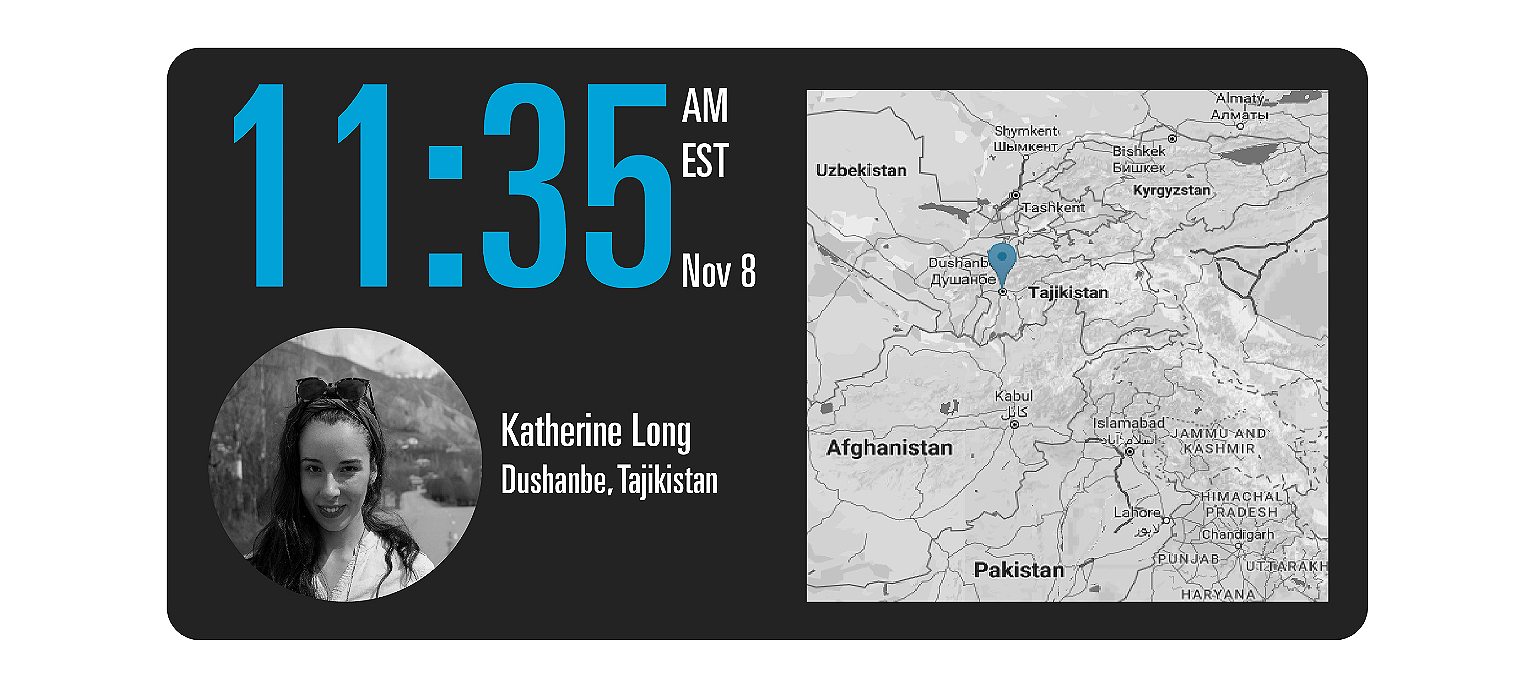
As early-morning polls open half a world away, half a dozen people are still lined up outside the Dushanbe office of the Russian Federal Migration Service, collars turned up against the frigid November air. The sun sets over Tajikistan’s dusty western plains. They shift from foot to foot and clutch their packets of documents. They’re waiting for their Russian citizenship hearings: an important bureaucratic rite in this majority-Muslim country heavily reliant on its close economic relationship with Russia.
“I’m behind Trump,” says one middle-aged man. “He’s the only one who will keep good relations with Russia.” Like many Tajiks, he splits his time between Russia and Tajikistan; he has family and a job in both countries. Western sanctions against Russia have had a ruinous effect the economy of this already-impoverished post-Soviet state. Tajik migrant laborers, unable to find work in a depressed Russia, have had to return home, flooding the job market here. More tensions between the West and Russia can spell no good news for Tajikistan’s economy.
Students from the nearby teacher’s college surround a hot dog stand—Tajikistan’s ubiquitous street food, lukewarm and sopped in ketchup, mayonnaise and pickled carrots—clutching jackets at their elbows for warmth. For them—for the vast majority of Tajiks—today is just a normal Tuesday. “There’s an election in America?” one young man asks me. “Who’s the president now?” “Obama!” chides his friend. “And there’s a woman candidate, right?”
But next door at the U.S. Embassy-funded American Corner, a cultural center aiming to promote American culture and English-language acquisition, the mood is more like election fever. A blown-up photo of the White House graces the entryway; red-white-and-blue paper chains hang from every stairway and lintel; larger-than-life cardboard cutouts of Trump and Clinton grin winningly near the reception desk.
Here, in a building darkened by one of Dushanbe’s not-infrequent power outages, two teams are working hard to put the finishing touches on their arguments in preparation for an early-morning election-watching-party debate, the last in a long-running series of Corner election debates. The topic is immigration: One team has been assigned to defend Trump’s policies; the other, Clinton’s. The debaters—five Tajiks and one game American language student—practice their elocution (“Give me your tired, your poor!”) and stress about fumbling their English in front of the U.S. Ambassador, who will host tomorrow’s event.
Other worries are more political: “What if Trump has already been declared president by the time we debate?” asks one member of the Clinton team, frightened at the possibility he might accidentally insult the Ambassador’s new boss. “Perhaps we should moderate our tone… not say so many bad things about him.” The Trump team has different fears: “This is a failed position,” moans one debater. “How can we be expected to defend this?”
A strong strain of understandable bitterness runs through Tajiks’ opinions about the election. “Whoever the president is, America will still screw us over,” one loiterer outside the Russian Consulate says. Online, the sentiment is the same: “The American elections are a circus in which two shit-flingers try to fool the world with statements of democracy and freedom,” reads one comment on a Tajik-language news service’s Facebook page.
At the end of the day, for those Tajiks who are following the election, this is a two-issue race. In the words of a debater, “Trump will discriminate against Muslims, but Clinton has a history of acrimony with Russia… If you ask who Tajiks should support, you’re asking us to choose between our identity and our economy.”
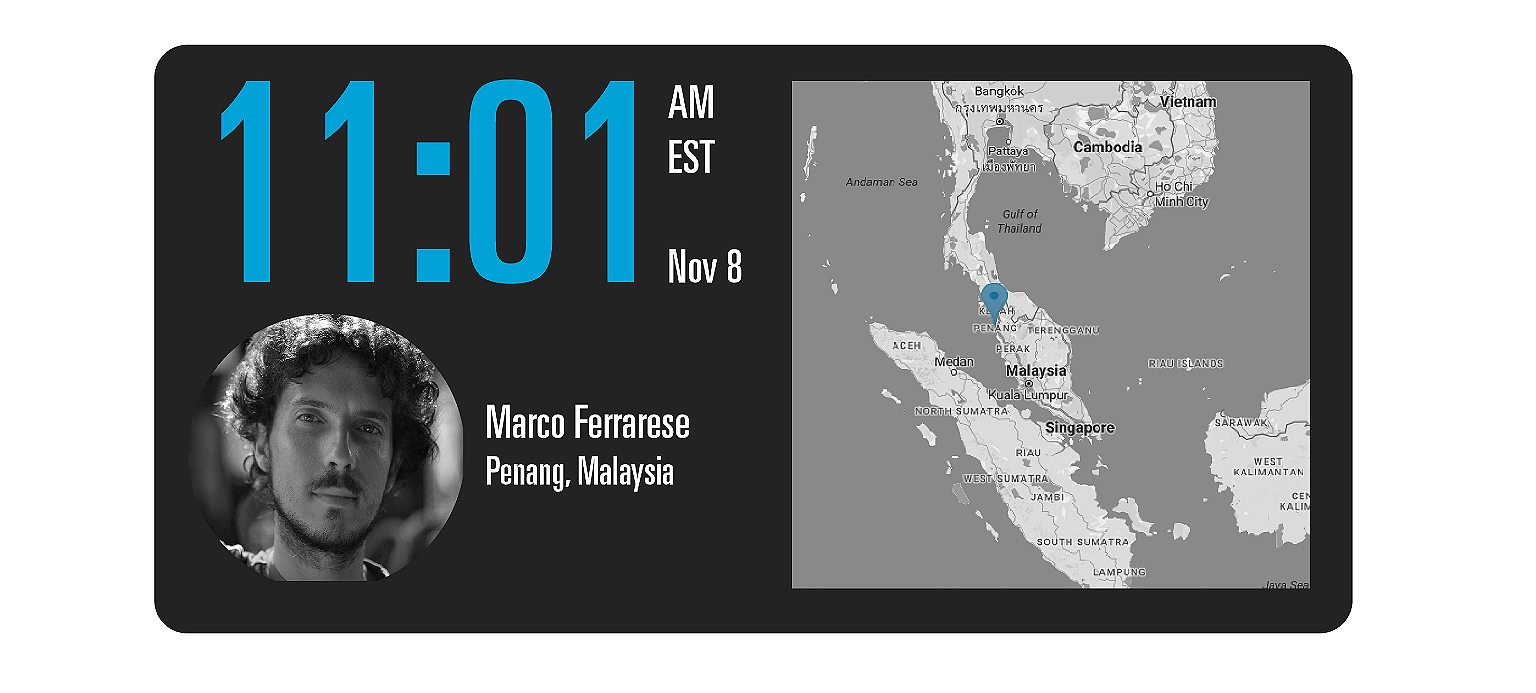
On the eve of the American presidential elections, tropical life goes on as usual in Malaysia. In the cities, people keep piling into their cars on their way to work, braving the usual nerve-racking traffic jams. The local English language news doesn’t say much about Donald’s and Hillary’s latest tantrums; the Chinese press has been the best at following their antics, but in this multi-ethnic, multi-religious, and multilingual nation, that’s not a guarantee of general interest.
There’s a monsoon striking the East coast, normal at this time of the year. But the rain that keeps striking the West coast seems eerily well-timed to American political events. Malaysians, however, blithely open their umbrellas and move on.
“I’m not really following the elections,” Julia Tan, editor of Penang Monthly, says. “From what I’ve heard and read, though, Trump’s an asshole and will be a harbinger of doom should he be elected as president.”
From Kuala Lumpur, Ben Liew, who works in media and is a part-time punk rocker, tries to explain the reasons for such detachment. “In general, the majority of Malaysians who are Malay Muslims don’t really care about American politics except when there’s war that is purportedly staged by the Illuminati or when Israel oppresses Palestine,” he says. “No doubt, Trump and Clinton remind us of the stupidity and cold-heartedness of our own politicians, pandering to the fears of the people.” Liew seems to be referring to Prime Minister Najib Tun Razak and his cronies, a coalition that has gridlocked Malaysia’s political system for the past six decades.
Another local rocker, Joe Kidd, a Malay and guitarist of the first Malaysian punk band Carburetor Dung, recently visited New York. “What a catastrophic conundrum!” he says from his home in Kuala Lumpur. “There’s no ‘lesser evil’ to vote for… to quote [the band] The Damned, both candidates are equally grimly fiendish.”
The sentiment is similar among the increasing population of foreigners living in Malaysia. “Politicians who use language that promotes division between people are on the rise, we should all be wary,” says Simon Bond, a British photographer. David Campbell, another Brit, has made Malaysia home for the best part of a decade. “As my father used to say, ‘it doesn’t matter who you vote for, the government will win.’ American foreign policy will not change: they will still be imperialist aggressors vying for global hegemony.”
However, some beg to differ. “I hope Americans will vote for Trump. He is not really a ‘career politician’ like the Clintons. Trump is basically decent… an unpolished work in progress?” says Lu Teik Hooi, a self-employed entrepreneur from Penang. Lau Shu Shi, a Bornean Chinese and young social worker from Miri, can’t help but feel sorry for all her U.S. friends. “This is a situation where voters have to pick one apple from two rotten fruits. The United States is among the few countries that won’t sign the CEDAW, and with Trump, that will be impossible,” she says, referring to an international treaty on women’s equality that the U.S. has never ratified.
Outside, the rain has stopped, but the sun won’t come out. Maybe tomorrow, with another President of the United States? Still, Malaysians won’t care. They always have an umbrella ready, as they are used to dealing with the rain.
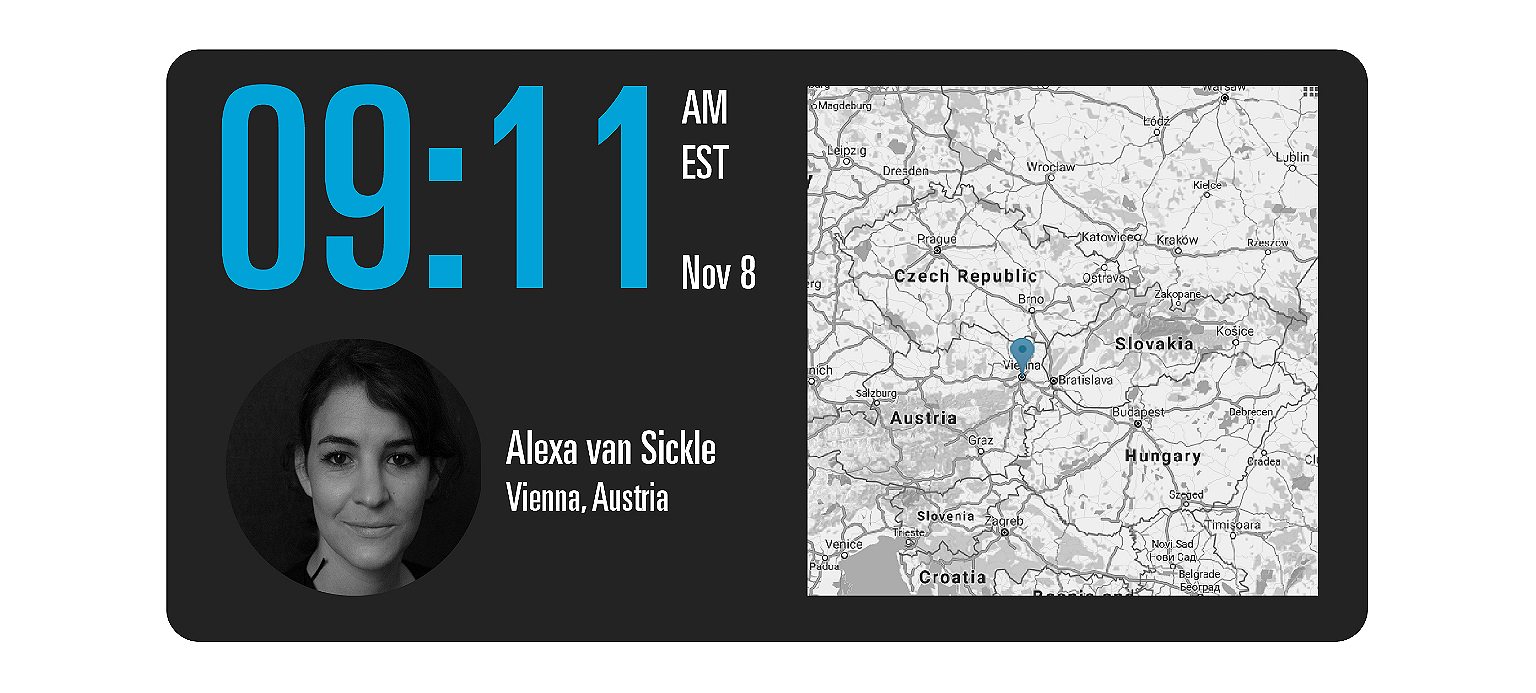
The evening before the U.S. election is a grey, wet Monday. Vienna’s Naschmarkt—an island of food markets jutting off the city’s inner ring road—is pretty quiet. At 6 p.m., the food stalls—selling baklava, oysters, cheeses, improbable amounts of olives, and one with an LED screen advertising its wares as Sex Spices (are there any other kind?)—are starting to shutter. The market’s restaurants—sushi joints, taverns, and famous Levantine spots—start to fill up.
The Landsknecht, a cozy Beisl—guesthouse—is eye-wateringly smoky. At the bar sits Walter, an almost-elderly man with a gravity-defying grey mustache, the ends styled upwards. He has only one word to say about the U.S. election before he downs his half-glass of beer and stalks out: “Kasperltheater.” Kasperl is a traditional puppet character from a pantheon of Germanic childhood stories; Kasperltheater is a children’s hand-puppet show. It’s a wonderfully specific, regional term, but in the political context it says so many things: Bullshit. Amateur hour. A drawn-out saga. Staged buffoonery. A shitshow.
One of Walter’s companions, a blonde, middle-aged woman, invites me for a drink at the Stammtisch—regulars’ table—to apologize for his brusqueness. Doris Wallentin owns the Landsknecht; in fact, she is the only Austrian owner left in the Naschmarkt, where the stands are now mostly Russian and Turkish-owned. We chat about the market before landing back on Donald Trump, when, as often happens in the last few months, I end up fielding questions.
“Is Trump going to win? How is it even possible that someone like this could get this close? Are the Americans really deppert (stupid) enough to elect this man?” asks Wallentin, a blonde, middle-aged woman, gesticulating wildly. Her friend, with long red hair, wrapped in fur and cigarette smoke, gives me a questioning look. I have no answers.
Wallentin says Austrians are hugely worried about a Trump win, but they are also preoccupied with their own Kasperltheater. Austria is deep into its own mad presidential election season, and on December 4, it might elect Europe’s first far-right head-of state since World War II.
In May, Green Party candidate Alexander van Der Bellen beat the Freedom Party’s Norbert Hofer—who says he carries a gun for self-defense from dangerous immigrants—by only 31,000 votes. Hofer successfully challenged the result, and October’s do-over election was delayed because of faulty glue on postal ballots. This political soap opera has been hugely embarrassing for the normally reassuringly dull Austria: hand-wringing op-eds lamented that its election snafus made the country a global laughing stock. (A rather ambitious claim, I thought, for a country frequently confused with Australia.) And while in Austria the president is a more ceremonial role—the main executive power is with the chancellor—Hofer’s election would legitimize a fringe party and embolden Europe’s far-right movements.
Hofer has frequently been compared to Trump in U.S. and U.K. media. But Austrians seem nonplussed by these comparisons: they see Trump as a class of his own. Sure, Hofer’s party was founded by former Nazis and thinks nothing of running Islamophobic campaign posters, dark waters that Trump has dipped into with his taboo-shredding sound-bites. But even the Freedom Party’s immigration-averse voters draw the line at Trump: As Hofer and Van Der Bellen have split Austrian voters at around 48 percent each in the polls, one study found that 90 percent of Austrians would vote for Hillary Clinton; only 4 percent would vote for Trump.
“We’ve had our ups and downs, of course. But Trump is really… something else.” says Wallentin.
Hours before the U.S. election, Clinton’s poll results were inching incrementally higher. But 18 days from his own, Hofer had an edge in Austria’s polls, and his party had a record-high in the parliamentary polls, too. A Trump win would be the greater tragedy for the world, but a Hofer win would be plenty tragic for Austria, and for Europe.